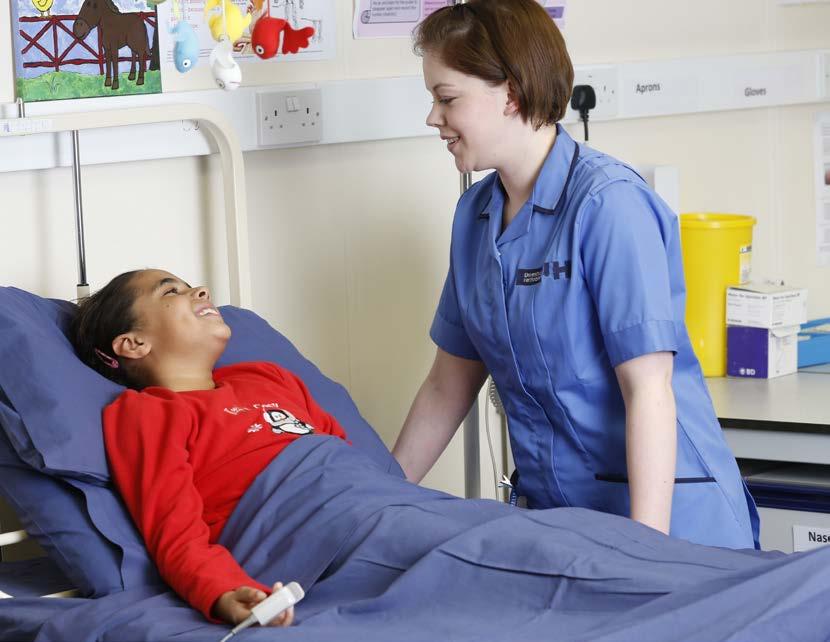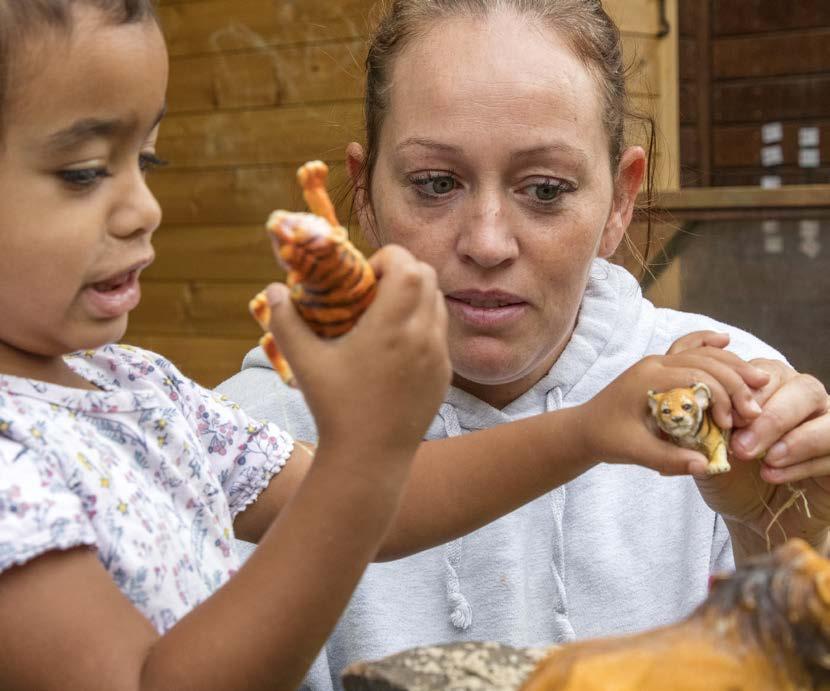POWERING POTENTIAL
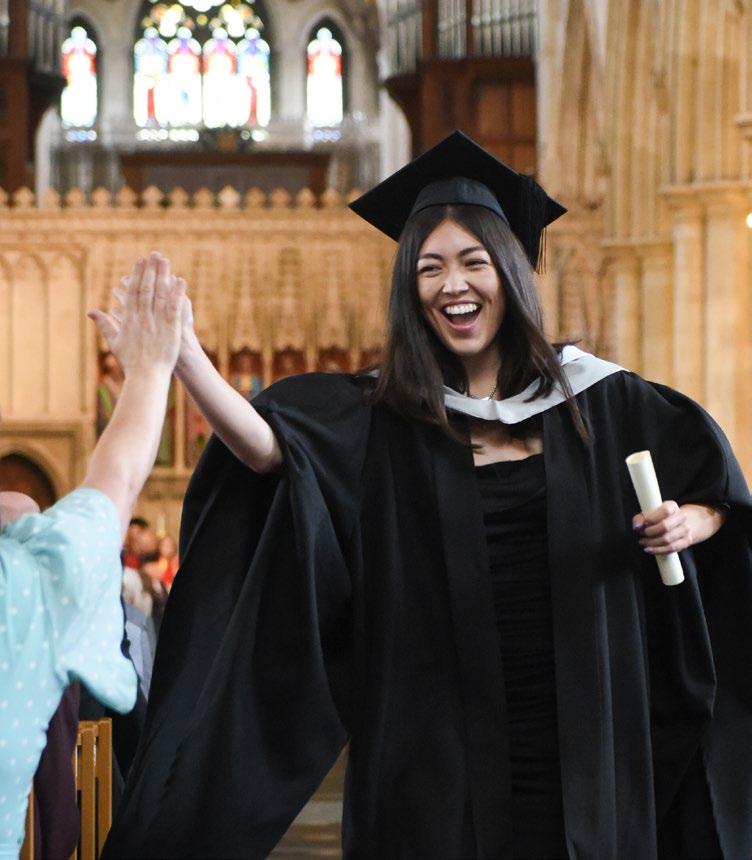
Our vision is to transform lives, and power the potential of not just our students and staff, but our wider community. Our students graduate with excellent skills aligned with the needs of employers and industry, enhancing their career prospects. We co-design, implement and grow business ideas and ventures, making our expertise accessible to market and powering businesses across the region.
Professor Quintin McKellar CBE Vice-Chancellor
Ranked among the top 10% of Universities for local growth and regeneration Research England
Ranked 16th in England for social mobility impact
Institute for Fiscal Studies 2021
We jumped 12 places in the 2023 Complete University Guide league table, and climbed 16 places to 74th in the 2023 Guardian University Guide
School of Life and Medical Sciences
School of Physics, Engineering and Computer Science
School of Social Sciences, Humanities and Education
to the University 4 Our
6 Executive team 8 Our vision and strategic plan 10
and student experience 12
13 Enterprise 14
engagement 15
of Study 17
Contents Welcome
history
Education
Research
Global
Schools
18
Hertfordshire Business School
28
44
76 3 One of 17 universities awarded the Race Equality Charter Mark Ranked in the top ten in all areas of the survey Postgraduate Taught Experience Survey 2022 One of only 20 universities awarded University Enterprise Zone status 90% of our research has been judged as ‘internationally excellent’ or ‘world leading’ Research Excellence Framework 2021
Hertfordshire Law School
School of Creative Arts 36 School of Health and Social Work
54
64
Welcome to the University of Hertfordshire
Set across two campuses and our Bayfordbury Observatory, we’re just 20 miles from London.
As an innovative, enterprising university, focused on transforming lives, we care about our staff and students and provide them with the opportunity to succeed no matter what their background.

4 Powering Potential
With our heritage in Britain’s pioneering aeronautical industry, we have been an innovative force in education since the early 1950s, and our focus on students’ employability and transferable skills can be traced back to our aeronautical origins.
We drive economic growth through cutting-edge research, creative and innovative thinking, skills development, bespoke training, and facilities that help businesses achieve their potential. All of our activities are underpinned by our core values; we are friendly, ambitious, collegiate, enterprising, and student-focused in everything we do.
We have just under 32,000 students studying over 550 undergraduate, postgraduate and research degrees in the UK. We also have more than 6,500 students taking courses outside the UK through international partnerships and franchise arrangements.
Our teaching is delivered across seven academic schools: Creative Arts, Health and Social Work, Hertfordshire Business School, Hertfordshire Law School, Life and Medical Sciences, Physics, Engineering and Computer Science, and Social Sciences, Humanities and Education.
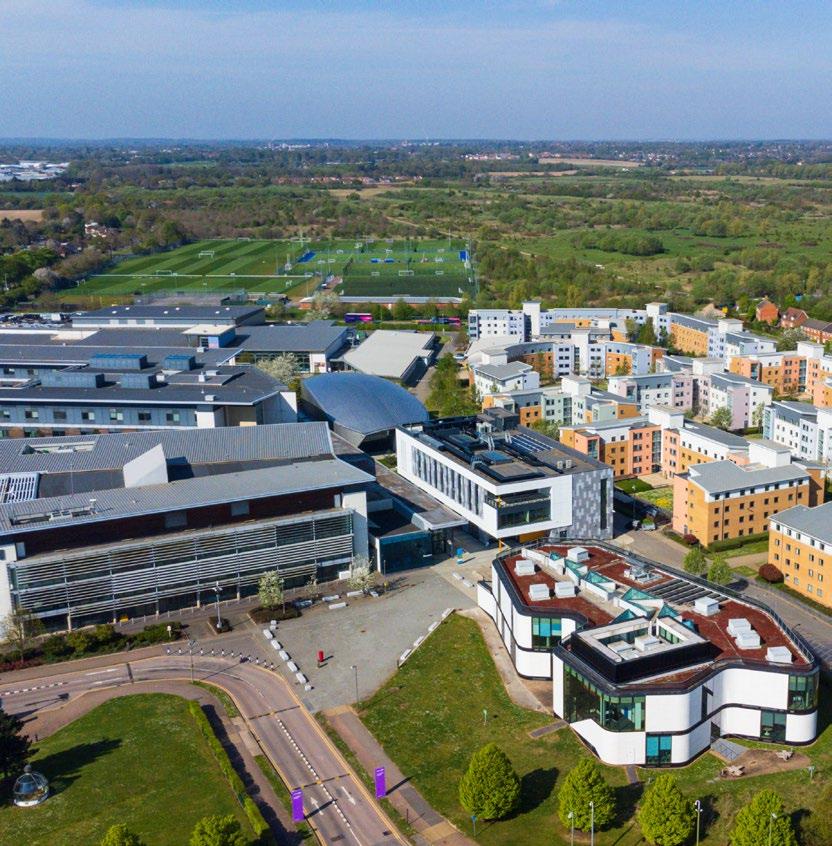
5
de Havilland Campus
Our history
19521959
Hatfield Technical College
1952 saw the opening of a new Technical College in Hatfield, with HRH Prince Phillip, Duke of Edinburgh performing the opening ceremony. With its roots in Britain’s pioneering aeronautical industry, the College soon established itself as an innovative force in education, awarding our first BSc (Engineering) qualifications to external students of the University of London in 1959.

19601968
Hatfield College of Technology
In 1960, the institution was renamed Hatfield College of Technology and began to invest in computer science, buying the College’s first digital computer in 1963 – a National Elliott 803B digital computer, at a cost of £24,010. In 1965, the college became recognised for 13 Honours Degree courses, including Computer Science and Civil Engineering, with BA (Hons) Business Studies coming a year later.
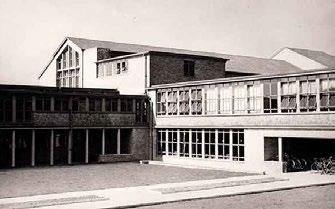
6 Powering Potential
19691991 1992 - Present
In 1969, the College was designated as Hatfield Polytechnic, and by 1970 had formed the best equipped and staffed Computer Centre in education. In 1975, the Polytechnic was reorganised into five schools of study and a centre for Management Studies.
Hatfield Polytechnic University of Hertfordshire
Hatfield Polytechnic became The University of Hertfordshire on 29 June 1992. In 2003 the de Havilland Campus, a £120 million project, was opened by HRH Prince Philip, the Duke of Edinburgh. In 2016, he visited the campus to open the £50 million Science Building. Our Enterprise Hub was opened in 2021. Today, we have a student community of just under 32,000 on UK based programmes across our campuses.

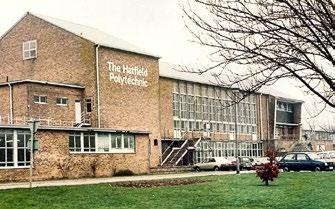
7
Executive team
As Chief Executive, the Vice-Chancellor exercises considerable influence upon the development of University strategy, the identification and planning of new development and the shaping of the University ethos. The executive team – the Deputy Vice-Chancellor, Secretary and Registrar, Executive Director for Business, International, Marketing and Recruitment, Pro Vice-Chancellor Education and Student Experience, Pro Vice-Chancellor Research and Enterprise, and the Group Finance Director all contribute to this aspect of work.
Professor Quintin McKellar CBE Vice-Chancellor and Chief Executive

Quintin has been the Vice-Chancellor and Chief Executive of the University since 2011. His responsibilities include the day-to-day running of the institution, the delivery of strategic and operational plans, performance, its internal structure and organisation, and its interface with external bodies and agencies. In 2015 he was elected as a Board member of Universities UK (UUK), and in 2020 was elected as UUK Vice-President (England and Northern Ireland). In 2021 he was elected as a Board member of Advance HE. He was made Commander of the Order of the British Empire (CBE) in 2011 for services to science.
Professor Julie Newlan MBE Deputy Vice-Chancellor

Julie was appointed Deputy Vice-Chancellor in February 2022. She was previously Pro Vice-Chancellor for Business and International Development. She is engaged in all strategic and operational decisions which underpin the positioning and success of the University, and will be leading the University’s strategic plan.
Julie has overall responsibility for University planning, including the development of all academic areas through the respective deans, staff development, international and regional partnerships and developments, recruitment, induction and retention of students, student experience and student outcomes.
Sharon Harrison-Barker Secretary and Registrar

Sharon was appointed in January 2020. She was previously the Academic Registrar, Head of the Student Centre and Faculty Registrar for the Business School and has worked in various further and higher education institutions. She achieved an MBA in Higher Education Management from the University of London in 2010.
Sharon is responsible for the management and operation of the Board of Governors and the Academic Board, compliance with University policies, regulations and procedures, legal matters of the University and its wholly owned subsidiaries, health and safety, internal audit, equality, registry, human resources, library and computing services, the office of the dean of students and professional staffing.
8 Powering Potential
Jo Stuart Executive Director for Business,
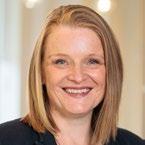
International, Marketing and Recruitment
Jo was appointed in March 2022, and oversees the work of Marketing Communications, Business Development, and the International Office. She joined the University in 2018 as the Director of Marketing and Communications and over the last four years, Jo has worked tirelessly to transform the University’s marketing and communications function by embedding insight and data-led decision-making across all marketing and communications activities.
Jo previously worked in the Financial Services sector, bringing with her 20 years’ experience in senior leadership roles across product development, marketing, communications and sales.

Dr Mairi Watson Pro Vice-Chancellor (Education and Student Experience)
Mairi joined the University in May 2020 as Pro Vice-Chancellor Education and Student Experience. She leads strategy and performance, as well as policy development and delivery, in learning and teaching, student experience, quality assurance and student union relationships. Mairi is a Chartered Fellow of the Chartered Management Institute and regularly contributes to external events on the leadership of educational change in challenging contexts.
Professor John Senior Pro Vice-Chancellor (Research and Enterprise)

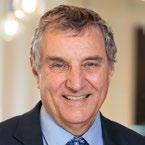
Appointed in 2006, John is responsible for leading University research and the delivery of research degrees, chairing the University Research Committee, developing international research partnerships in Australia, China, Malaysia, and Vietnam, and overseeing the Doctoral College, which is a community of more than 700 research degree students.
From 2003 to 2006 John was the University Director of Enterprise and Knowledge Transfer as well as being a Dean of Faculty.
He has an international research profile in the field of optical fibre communications and networking, is on the Executive Committee of the Engineering Professors Council and chairs the Research and Enterprise Network for Universities (RENU).
Alistair Moffat
Group Finance Director
After a career in senior positions in the transport industry, Alistair was appointed Group Finance Director in 2009. He has responsibility for all aspects of financial management within the University Group, including financial control, statutory reporting, treasury, tax, insurance, procurement and commercial financial support for the academic community.
His role incorporates Board responsibility for the management of the University's estate and sport. He is a director of UH Holdings Limited, which oversees the commercial subsidiaries in the Group, and is a director of our subsidiary companies.
Alistair was joint chair of the London and South-East British Universities Finance Directors’ Group (BUFDG) from 2016-2021.
9
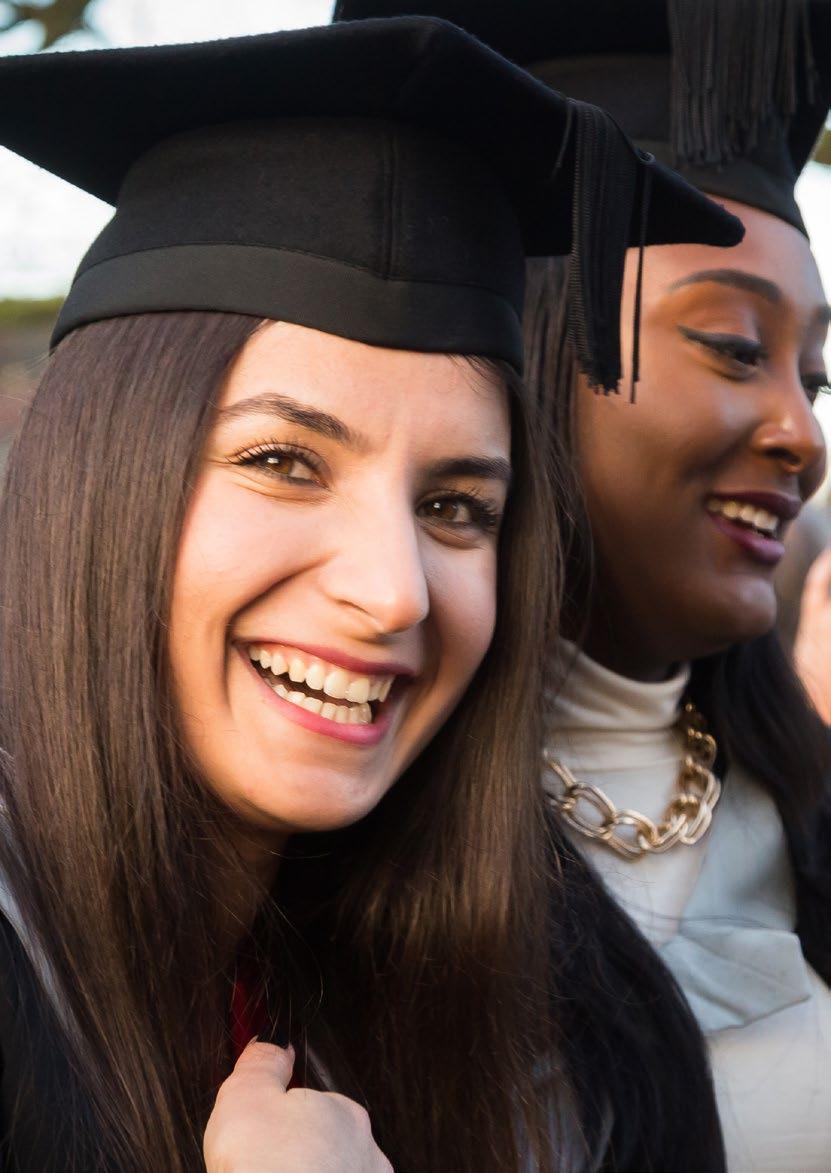
10 Powering Potential
Our vision and strategic plan
Our vision to transform lives reflects the ambition and inspiration that is central to the University. It is built on the belief that whatever your background, wherever you are from, higher education can be a transformational experience. And whoever you are, the application of university research can impact your life. We are committed to having a positive transformational impact on every member of our University community.
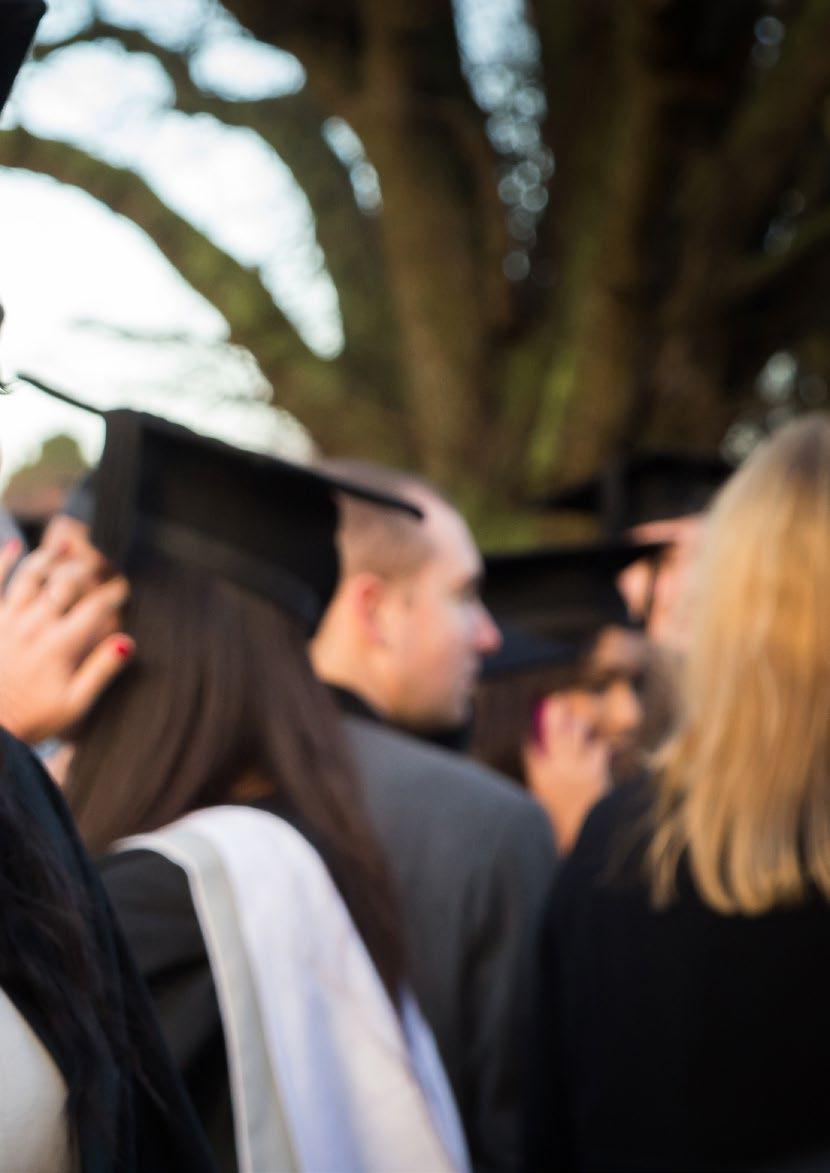
Students and staff contributed to the development of our strategic plan which informed our focus on transforming lives. It reflects the values of ambition and inspiration that are central to the University. Our three key themes of opportunity, community and flexibility also grew out of this engagement and reflect both what is important to the University, but also how we will approach challenges in the coming years.
The 2020-2025 strategy builds on our strengths and embeds our focus on employability, enterprise, and business partnerships. It looks at future challenges – modern technologies, the changing world of work, and increasing interconnectivity across the globe – all areas our students presented to us in 2018 as future challenges.
Scan or click below to find out more about our strategic plan go.herts.ac.uk/strategic-plan

11
Education and student experience
We deliver high-quality and distinctive education that transforms lives by providing opportunities to develop students’ skills for life, working in partnership with our student community, and delivering flexible education with clear career pathways.

We do this through the expertise of our academic staff who design and deliver our courses. More than 70% of our staff hold professional recognition through Fellowships of the Higher Education Academy in teaching and learning compared to 54% across the sector.
We are proud of our 14 Principal Fellows and 80 Senior Fellows of the HEA, and our 10 National Teaching Fellows and 22 Professors and Associate Professors in Teaching and Learning.
Our Widening Access work targets primary- and secondary-aged learners, while our Student Success work supports learners currently studying at the University. Students are selected based upon where the data indicates gaps in equality of opportunity in relation to access, success or progression.
We are proud of our strong record in increasing access and participation at Herts. This is evident in our student population and the proportion of students from underrepresented backgrounds.
“ I had such a wide variety of placements – they were all so different! My mentors were lovely, and the classes were great. I think my favourite thing though was the change I felt between my first and last placements. When I was standing in front of the whole class, teaching lessons I had planned myself, feeling confident in a way I couldn’t have imagined during my first placement – that was amazing! ”
Rebecca Shelford BEd (Hons) Primary, 2021
12 Powering Potential
Research
Our research transforms lives and addresses fundamental global and societal challenges.
The University has made the biggest jump in research impact results across the higher education sector, according to the recent 2021 Research Excellence Framework (REF) assessment released in May 2022.
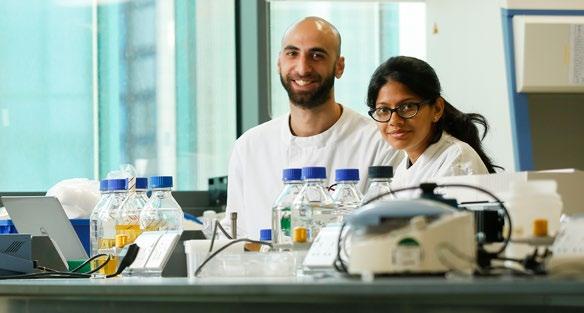
We are ranked in the top 25% nationally at 32nd, the highest position for a post-92 university, and a huge rise of 61 places compared to the previous REF in 2014, the biggest rise of any university.
Held every 6-7 years, REF is a nationwide assessment of the quality and impact of research at UK higher education institutions, based on evidence submissions that detail research outputs, real-world impact and benefits, and the institution’s research environment.
Research culture at the University is defined by a strong spirit of enquiry, innovation and enterprise, and feeds into teaching and learning to enrich our students’ experience.
We collaborate on inter-disciplinary projects not only with our colleagues, but also with international agencies, industry, the public sector, and other universities around the world. Our partnerships always have the shared aim of improving people’s lives.
From monitoring air quality to protect public health, to enhancing health in care homes and communities during the pandemic, our research has impact.
The work of an expert team of researchers from the University of Hertfordshire has been used to fundamentally improve how care homes and the NHS work together. By the end of 2020, the national Framework for Enhanced Health in Care Homes had been rolled out nationally to cover around 11,300 care homes and 410,000 care home residents.
Scan or click below to find out how our
go.herts.ac.uk/herts-research

13
amazing research makes a difference to people’s lives
Highlighting the real-world benefits to wider society, 90% of our research was classified as having ‘outstanding’ (4*) or ‘very considerable’ (3*) impact. In certain subject areas this was even higher, with Psychology obtaining a 100% 4* research impact rating.
Enterprise
The University is an institution with enterprise at its core. Within our University Enterprise Zone we have formed clusters of excellence that respond to regional and national demands, providing students and businesses with access to funding and specialist business start-up, innovation and growth support.
In our interactions with the wider community, we aim to foster and create a collaborative environment and entrepreneurial culture that is connected, inclusive, ethical, and inquisitive.
One of the ways we support start-ups is through our start-up challenge award - Flare Ignite. It offers student entrepreneurs the support, advice and training they need in areas like proposal writing, planning, finance and marketing, and the opportunity to win up to £3,500 to get their business idea off the ground and bring it to life.
Scan or click below to find out how our enterprise team can help you go.herts.ac.uk/ enterprise-zone



Kim won the 2021 Flare Ignite Social Impact award. She is a budding entrepreneur who wants to improve the lives of families with children who have special educational needs and disabilities (SEND).
“ What I learnt as a student has provided the foundations for my career and I will always be grateful for the University’s support throughout my studies. It’s because of this support that I felt confident and comfortable enough to enter the Flare Ignite competition as a graduate and challenge myself to make SENDplan a reality. ”
Scan or click below to hear more about Kim's SEND plan go.herts.ac.uk/kim
We offer expertise in apprenticeships. Apprenticeships play a crucial role in boosting the economy and are an effective way for businesses to develop a motivated, skilled, and qualified workforce, either by upskilling existing employees or recruiting new talent. The apprentice will gain a recognised qualification while earning a salary and gaining relevant industry experience.
14 Powering Potential
Global engagement
We provide international opportunities for staff and students, building a diverse community on our campus, and increasing flexible programme delivery for the overseas market.
With more than 100 international partnerships across five regions, and partnership models including franchise, dual awards, fly-in faculty, academic support, supported distance learning and recognition and articulation agreements, we are passionate about providing students around the world the opportunity to study for a University of Hertfordshire award.

We are proud to be a participant of the QE-TNE scheme. The scheme independently measures quality across the UK’s Transnational Education sector and promotes continued evaluation, improvement, and collaboration on a global scale.
In 2019 we launched our largest scale transnational education partnership with a new institution, Global Academic Foundation in Egypt. Students can study a University degree in multiple subject areas, including Business, Computer Science, Engineering, Mass Communications, Pharmaceutical Science and Physiotherapy. Located in the centre of Egypt’s new administrative capital New Capital City, 20km east of Cairo, our campus is one of the first institutions to open in New Capital – a purpose-built capital city the size of Singapore.
Scan or click below to find out more about our international partners go.herts.ac.uk/partners

15
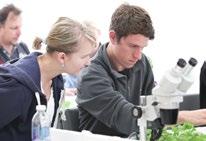
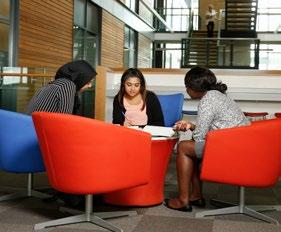
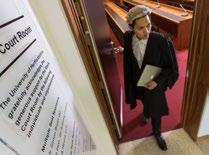
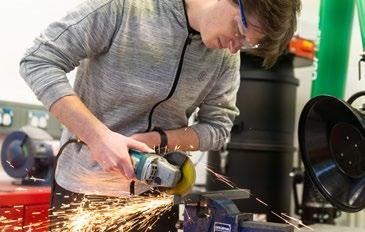
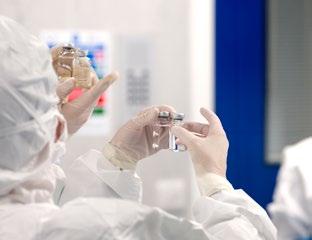
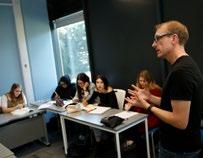

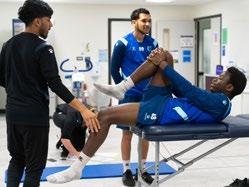
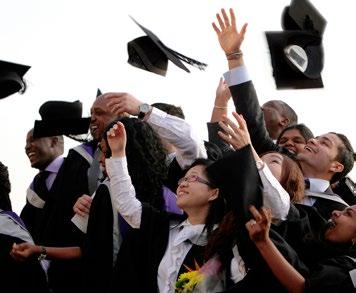
16 Powering Potential
Schools of study
The University is home to seven academic Schools of study, each of which is led by one of our experienced Academic Deans. The Deans and their Associate Deans have both research and industry experience, providing each of the school’s leadership teams with the knowledge and skills that our students need to achieve high quality graduate jobs across a breadth of industry sectors.
All courses are accredited by professional bodies, with 90% of the University’s research impact classified as outstanding or very considerable in the 2021 Research Excellence Framework (REF). The REF is a nationwide assessment of the quality and impact of research at UK higher education institutions. Hertfordshire Business School
17
Page 18 Page 44 School of Health and Social Work Page 76 School of Social Sciences, Humanities and Education Page 28 Hertfordshire Law School Page 54 School of Life and Medical Sciences Page 36 School of Creative Arts Page 64 School of Physics, Engineering and Computer Science
Hertfordshire Business School
Subject areas
Accounting and Finance Business Analysis and Statistics Economics
Human Resource Management Information Systems and Information Management
Marketing and Enterprise Strategy
Tourism, Hospitality and Event Management
Our goal is to be the number one choice for students seeking a truly transformational education. Their success is our priority, as we support their progression from a learner to an employed professional: a person capable of leading colleagues, managing major projects and succeeding in the evolving global business landscape.
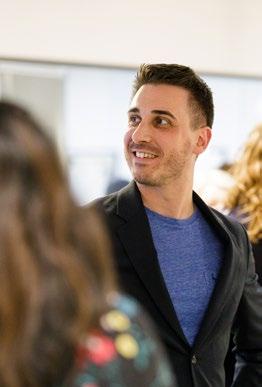

 Damian Ward Dean of the Hertfordshire Business School
Damian Ward Dean of the Hertfordshire Business School
18 Powering Potential
Ranked 14th for Economics
Guardian University Guide 2022
Research Excellence Framework 2021
Hertfordshire Business School is one of the largest and most exciting Business Schools in the UK excelling in contemporary, practice-led, opportunity-rich education, delivered hand-in-hand with regional and international businesses.
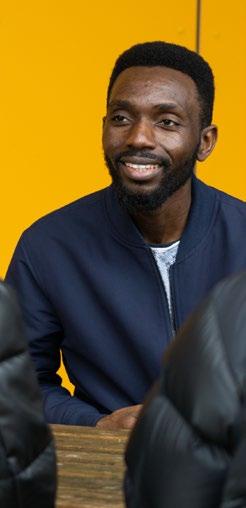
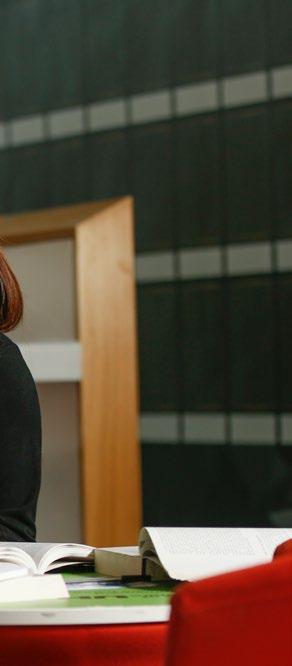
We are at the frontline of business education with over 300+ academic and practitioner staff leading an authentic and inclusive learning experience for over 7,000 students on campus and supporting 4,000 students studying overseas with our global partners. Close to 26,000 scheduled learning activities per annum are delivered with more than 3 million hours of transformative student learning.
We span accounting, economics, human resource management, business analysis, digital marketing, tourism and event management, with specialist research clusters in Business Technology, Ageing, The Gig Economy, Societal Economics and Business Sustainability, and active consulting teams in Statistical Services, SME Business Growth and Market Research Services.
In 2021, our School was awarded the Small Business Charter, recognising its commitment to championing the small business community in the region. This opened the doors to local SMEs joining the first Hertfordshire Help to Grow Management programme, funded by the Department for Business, Energy and Industrial Strategy, designed nationally, and delivered by the Business School.
One of only 55 Business Schools in the UK accredited by the Chartered Association of Business Schools to deliver the Help to Grow management programme
The impact of our Business and Management studies research was recognised when we climbed 79 places in REF 2021 rankings
19
Our experts are changing lives
From tackling climate change to helping ensure food and information security, our experts are committed to protecting people and the planet by finding innovative and sustainable solutions to the most critical social, environmental and economic challenges facing society today.
Professor Eren Demir Professor in Decision Sciences Head of Managing Complex Change Research Group

Eren is a healthcare modelling specialist who combines the expertise in strategic consulting and advanced analytics, offering decision makers powerful tools to appreciate the complexity of their system and understand its inner working, ie ‘tools for thinking’. It gives the opportunity to evaluate the implications of possible policies before the actions are implemented in the real world, hence avoiding the trap of ‘doing things and hoping for the best’.
Eren has completed many research projects working closely with healthcare services nationally and overseas (eg Nigeria and Kenya), such as demand and capacity planning of hospitals; re-design of services to improve clinical outcomes; application of AI algorithms predicting adverse events; simulation of patient pathways; evaluation of service outcomes, and development of models to measure cost effectiveness.
Professor Jyoti Choudrie Professor of Information Systems

Jyoti's research is in the digital divide between older adults and Information and Communication Technologies (ICTs). Her main focus is examining and understanding the digital divide by considering internet access for older adults. She is researching the use of human centric artificial intelligence and has collaborated with Desi Radio, Age UK Hertfordshire, and Symbiosis International University in India to identify and understand misinformation about Covid-19 prevention and cure within older adults. She has been a keynote speaker for the International Congress of Information and Communication Technologies, Digital Britain conferences and supervises doctoral students from around the globe.
Jyoti has been named as one of the winners in the 2019 TechWomen100 Awards. The annual awards, held by WeAreTechWomen, showcase remarkable women within the Science, Technology, Engineering and Mathematics sector.
She was recognised for her extensive years’ of experience, specialising in investigating the social inclusion and adoption of ICTs on society’s ‘marginal groups’, as well as the adoption, use and diffusion of innovative ICTs in small to medium size enterprises and large organisations. Jyoti is currently leading a knowledge exchange partnership with YMCA Southend.
Scan

20 Powering Potential
here or click on the link below to find out more about our research expertise
go.herts.ac.uk/herts-research
Professor Hafiz Alaka Lead Researcher Applied Contemporary Technologies
Hafiz is a leading researcher in the area of applied contemporary technologies including big data, artificial intelligence and IoT. He studied short courses on Machine Learning and Analytics Edge at Stanford University and Massachusetts Institute of Technology respectively. He regularly collaborates with industry partners to help solve their challenges.
Hafiz is the founding Director of the Big Data Technologies and Innovation laboratory which currently hosts over 16 members of staff including postdoctoral research fellows, machine learning scientists, data warehouse/analyst expert, civil engineers, lecturers and senior lecturers.

The lab has various equipment and services required for project delivery, including a deep learning local server machine, VR ready endlessly expandable machine capable of rapid prototyping, numerous Apple Macbook Pros and Airs, Google Play and App Store developer’s accounts, Android and Apple phones and tablets, Vuzix Augmented reality equipment, IoT pollution monitoring sensors, large interactive visualization screen, AWS EC2 Big Data Infrastructure account, among others. Hafiz also leads the Prediction of Climate and its Impacts’ group in the Centre for Climate Change Research.
Research impact goes from strength to strength
Hertfordshire Business School has made a massive jump in its research impact results across the higher education sector, according to the 2021 Research Excellence Framework (REF), published in May 2022.
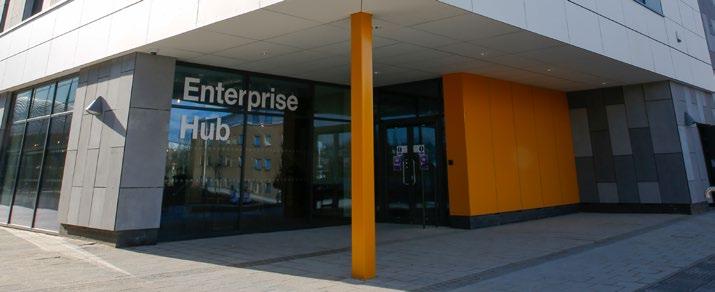
Results show that the School has risen to 17th in the rankings for research impact in business and management studies, one of the highest positions for a post-92 university, and a huge rise of places compared to the previous REF in 2014, the biggest rise of any university.
Highlighting the real-world benefits to wider society, over half of all research was classified as having ‘outstanding’ (4*) or ‘very considerable’ (3*) impact.
In overall research excellence, over three-quarters of research (78%) at the University has now been rated ‘world-leading’ (4*) and ‘internationally excellent’ (3*), compared to 57% in 2014. This has underpinned the University’s rise of 21 places up the overall national rankings to 62nd place.
21
Enterprise Hub at the de Havilland Campus
Dr Christopher Brown
FHEA, FRSA, MIKT, MIE, MIAM Associate Professor Enterprise
Market Research Service Consultancy Unit
Chris, Associate Professor of Enterprise, and Director of the Market Research Service is committed to entrepreneurship and small enterprise research work but also supports owner-managed enterprises searching for help and advice. He advises regional support agencies like Hertfordshire Local Enterprise Partnership and Hertfordshire Growth Hub. Chris has a particular focus on micro and small firms, working closely with the University’s incubation programme, and national knowledge exchange programmes such as Knowledge Transfer Partnerships (KTP) and Knowledge Exchange Embed Partnerships (KEEPs), and most recently is leading the Help to Grow management programme. He also leads the school’s MBA enterprise module to mentor and coach future entrepreneurs, both in their intrapreneurial leadership skills and their potential to start up their own enterprise.
Statistical Services and Consultancy Unit
Professor Neil Spencer Professor of Applied Statistics

Neil is Professor of Applied Statistics at the University and has been Director of its Statistical Services and Consultancy Unit for 20 years. He is a Fellow of the Royal Statistical Society and a Chartered Statistician. He has been undertaking contract research and consultancy work in statistics alongside more traditional research for over 20 years. In recent times, he has led a team carrying out the statistical analysis for the 16 separate surveys carried out in 13 European countries for the Digital Footprint Project concerning digitalisation and work, undertaken data analysis for the Gender, Digitalisation and the Future of Work project, funded by the European Institute for Gender Equality (EIGE), created a typology of labour disputes in work funded by the European Foundation for the Improvement of Living and Working Conditions (Eurofound), and was part of the London team for the EU Horizon 2020 PLUS (Platform Labour in Urban Spaces) project.

His consultancy work has included testing the randomness of National Lottery ball-drawing machines, creating a framework and dashboard for Healthy Working Analytics, work as an expert witness and reporting on the distribution of National Lottery grants.
Hertfordshire Business Academy opens doors to alumni and student community
Hertfordshire Business Academy is the school’s longestablished outward-facing gateway for business and professional collaboration, fostering a revolving door approach between business and academia. During the pandemic, recognising the lack of engagement opportunities, the Business Academy extended its reach to students and alumni to offer and encourage participation at networking events, business briefings, webinars and masterclasses.
While the academy's primary focus is to create an easy meet-up forum for academic/business introductions for exchange of ideas and collaboration, it also offers an accessible calendar of continuous professional development and training. Many opportunities are offered pro bono as part of our commitment to support local business and the alumni community. The 'Lets Talk About' webinars and the 'Live Learning Super Series' offer bite sized top-ups and refreshers on the latest hot topics.
Business Academy
22 Powering Potential
Hertfordshire
fosters a revolving door approach between business and academia.
To help drive new businesses forward, we provide access to the evolving research and expertise of hundreds of academic experts
Hertfordshire SME Help to Grow (HtG) Launch
We launched our first Help to Grow Management programme in January, one of only 55 Business Schools in the UK accredited by the Chartered Association of Business Schools to deliver this Department for Business, Energy & Industrial Strategy funded business leadership programme. Designed at national level by leading business academics, but delivered locally at Hertfordshire Business School by a team of 20 business tutors, coaches and mentors, the programme is an intensive and fast paced 12-week experience that combines latest thinking, theories, tools, best practice with action learning and 121 mentoring on business performance, resilience, and growth planning.
Business Incubation
We have an excellent reputation for supporting early stage businesses with flexible and fully equipped working spaces, access to our experts and a supportive peer network of like-minded professionals. We have helped over 130 businesses since the incubator was established in 2018. The designated business incubator co-working space is located in the Enterprise Hub on de Havilland Campus, just a 20 minute train journey from London.

To help drive new businesses forward, we provide access to the evolving research and expertise of hundreds of academic experts from the University. Incubator members can attend seminars, networking events and mentoring sessions.
Our Business Academy supports members of our incubator with much needed hands-on business expertise from our academic team and from student resources, signposting to curricula projects, and connecting businesses into live learning in undergraduate and postgraduate business degrees.
23
from the University.
Our inspiring alumni
Inspiring, engaging young entrepreneur, Tinique runs her own successful events business.


Her business is based on helping small and medium business owners bring their event vision to life, by managing every event detail, and freeing up their time to focus on core business growth.
Tinique Hay
BA (Hons) Event Management, 2014
Tinique’s mission is to increase the awareness of how powerful a detailed event marketing strategy is in helping business owners with their online and offline growth, visibility and sales lead attraction resulting in a successful return on investment.
“ My degree offered me practical modules throughout the course, which I could apply during my industrial placement year, and on my return to studies, where we were empowered to run a live event for students and lecturers. I loved this opportunity; it was really beneficial. ”
Purva was an exemplary student who took any opportunity to improve her career prospects by engaging with an impressive range of activities. Consequently, she received our prestigious Rising Star Award in 2021, which recognises students who have made an admirable impact.
Purva Aggarwal
MSc Finance and Investment Banking, 2021
Purva is the Founder and Chief Executive Officer of Good Good Piggy, an online bank and behavioural rewards platform, as well as India’s first EdFintech Start-Up. This was shortlisted for Shark Tank India and featured under the Next Leaders Column in Japan's Start up Review 2021.
Purva is the Ambassador of Women in Tech India, where her role is to extend a global ecosystem to Indian women and girls.
“ This award means a lot to me as it recognises the grit and passion I have to be laser focused in my intellectual interior. I would like to thank my professor, parents, mentors and friends who have always supported me in my choices and stood by me in my highs and lows. ”

Andrew joined Hertfordshire Constabulary in 2004 and has extensive frontline experience, working on Intervention, the Community Safety Unit and the Safer Neighbourhood Team. He is working to improve the constabulary’s strategic thinking as part of the Crime Reduction and Community Safety Unit, helping to make the force more efficient, as part of the Local Change Team.
Andrew Palfreyman
MSc Public Service Management (Senior Leader Apprenticeship) 2021
“ I recently completed a Master’s in Public Service Management with the University of Hertfordshire, winning the Hertfordshire Business School’s Senior Leader Degree Apprentice of the Year 2021, which supported my personal and professional aspirations, including my final dissertation which was a study of disproportionality in police stop and search powers. ”
24 Powering Potential
Today's students, tomorrow's workforce
Our growing population of around 7,000 business and management undergraduate and postgraduate students offers a huge and accessible talent and resource pool for employers.
New Postgraduate industry placements
Recruitment of students dramatically rose on four innovative postgraduate pathways offering a year working in UK industry. International Business is particularly valued by students and employers alike, for its tripartite study, work and applied project combination. Employing an international student in a professional role in the UK on a year placement is proving attractive for employers who often need more experienced, higher skilled postgraduates with a global outlook into their workforce.
One of the worlds’ best known hotel chains The Four Seasons Hotel recruited five postgraduate placement students in 2022 from our prestigious MSc International Tourism and Event Management programme.
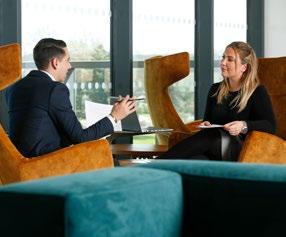
“ What stood out from the interns of the University of Hertfordshire was great learning attitude and passion for hospitality. The line level roles that interns have taken on board may have been challenging to start with but each student has demonstrated positive mindset consistently, which has hugely contributed to our employee and guest experience! ”
Boram Lee Director of Learning and
Talent, Four Seasons Hampshire
The students have worked in a variety of professional roles across the hotel, supporting the vital food and beverage and housekeeping operations. Within their development roles, they support delivery and management of large logistical events, such as weddings, and gain experience and real-life practice in event management projects. Learning new skills during their placement year, such as hands-on training of new members of staff equips the students with insights into the challenges in the hospitality business.
25 2021 saw Hertfordshire Business School postgraduate placements double, rising to over 140 students on a placement at many different employers in the region and nationally.
Supporting real world learning
We are a vital resource supplier to the local and regional business community, driving a pipeline of 7,000 business and management students as graduate, placement or internship resources.
With over 300 modules, embedding live curricular projects is a vital authentic real world learning opportunity for our students but critically, offers business access to much needed extra resources. With vocational learning at their core, the apprenticeship programmes we offer give employers a practical development pathway for developing highly skilled managers and enhancing leadership competence within their organisation.
We offer two courses; the Senior Leader Higher Apprenticeship, and the Chartered Manager Degree Apprenticeship, both of which are underpinned by research, led by experts and enriched with employer defined skills.
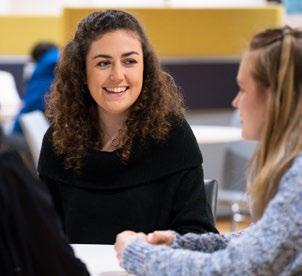
Management and leadership apprenticeships surge in demand
With vocational learning at their core, our business apprenticeship programmes, Senior Leader Higher Apprenticeship at Level 7, and the Chartered Manager Degree Apprenticeship at Level 6 continue to lead the way as practice led and authentic business education. They give employers a practical pathway for developing managers and enhancing leadership competence within their organisation.
We are one of the most successful deliverers of the senior leader apprenticeship in the UK with around 250 apprentices and around 100 employers accessing development. Around 80% of apprentices achieve a distinction or merit and 75% of apprentices experience a salary increase by the end of their apprenticeship.
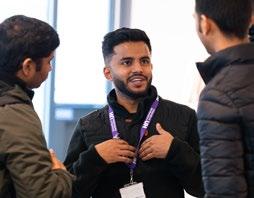
26 Powering Potential
We are one of the most successful deliverers of the senior leader apprenticeship in the UK with around 250 apprentices.
Business School degree apprentice wins national manufacturing “rising star” award
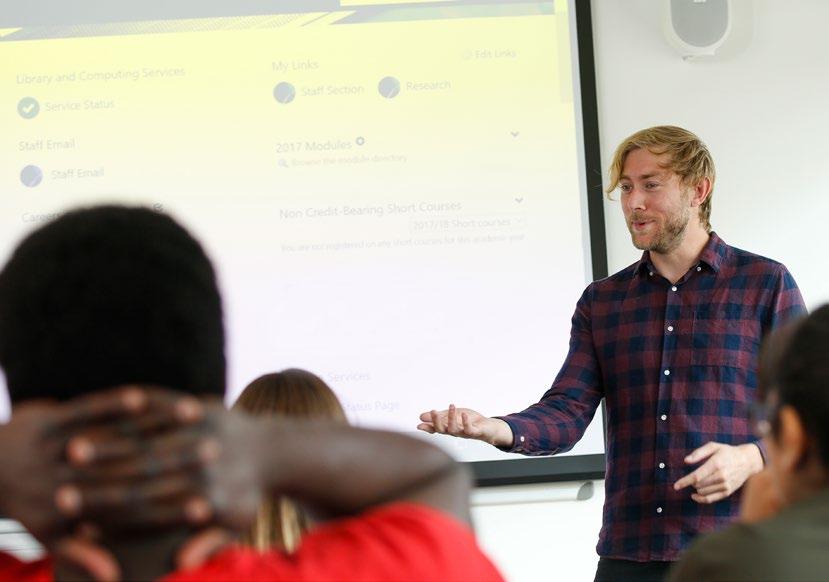
Josephine Ready was announced as the winner of ‘Business Apprentice of the Year: Rising Star’ in the Make UK Manufacturing Awards.
The award recognises businesses or commercial apprentices, working within engineering or manufacturing firms, in the early years of their apprenticeship programme who have done the most to seize the training and development opportunities presented to them.
Josephine works for Stevenage based company MBDA and is in the third year of the Business Management Degree Apprenticeship. She reached the final of the national award after winning the Midlands and East Regional Award.
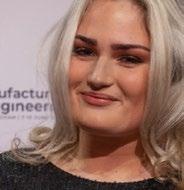
In her nomination, the judges were told of Josephine’s drive, positivity and leadership in her work, and of consistently setting a shining example to other apprentices at the company. They also heard about her extracurricular activities such as being a spokesperson for the Hertfordshire Opportunities Portal, and promoting apprenticeships through the Young Apprentice Ambassador Network and at the University.
Josephine Ready BA (Hons) Business and Management Degree Apprenticeship
27
Hertfordshire Law School
Subject areas Law and Criminology



My personal and professional experience drives my commitment as Dean to transforming our staff and students’ lives and I am passionate about the School being a friendly, open and supportive place for everyone.
Penny Carey Dean of the Hertfordshire Law School
28 Powering Potential
The first university since 1997 to be authorised to deliver barrister
training by the Bar Standards Board
Rated 4th for Law with a student satisfaction score of 85% according to the Postgraduate Taught Experience Survey 2021 81% overall satisfaction score among undergraduate Law students according to the National Student Survey 2022
Our Law School immerses students in the professional legal world through innovative teaching and outstanding facilities. From the £10 million law court building to the replica crown court for students to practice their skills, we are committed to providing practical applications for taught theory.
The courtroom experience helps students develop the skills of handling expert witnesses in collaboration with external partners such as local police forces and trainee social workers.
We encourage and support our students through a range of co-curricular activities to improve their confidence and understanding, ensuring they graduate with more than just a degree. They also have the opportunity to gain hands-on experience by volunteering in our Law Clinic, and improve their presentation skills through taking part in Streetlaw, by designing and delivering workshops in schools and community groups.
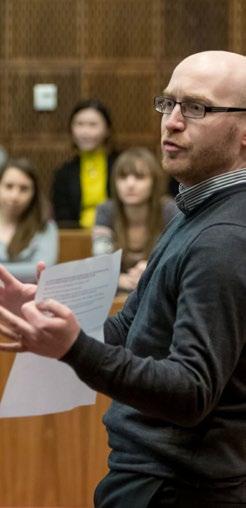
29
Our experts are changing lives
Jahid Hasan
LLB, LLM, FHEA Lecturer in Law International student support tutor

Jahid is a Lecturer in Law, International Student Support Tutor and researcher in the fields of International commercial law, investment law and alternative dispute resolution. Drawing on more than 10 years personal experience as an International student spanning undergraduate to PhD levels in UK higher education, he is passionate about supporting the academic and pastoral needs of International students who face unique challenges when transitioning to study in the UK. His specialist interests include Fair and Equitable Treatment in Bilateral Investment Treaties, Corporate Social Responsibilities and Investor-State Arbitration.
Jahid is also passionate about celebrating the diversity of our community and recently held a cultural diversity event, bringing together staff and students. The event included live cultural performances by students and was a huge success.
Dr Ferya Tas-Cifi

PhD, LLM, LLB, Fellow (HEA), Post Grad Cert Lawyer (registered Istanbul Bar Association)
Dr Tas-Cifi, Programme Leader for criminology specialises in genderbased violence, honour based violence, violence against women, socio-legal studies, feminist legal theory, legal pluralism, human rights, women and gender in the Middle East and Muslim world.
Her publications include Honour Killings and Criminal Justice: Social and Legal Challenges in Turkey.
Dr Chamundeeswari Kuppuswamy

PhD, MA, ML, BL Lawyer (registered Madras Bar Council)
Dr Kuppuswamy is the Research Theme Champion for Global Economy and a Senior Lecturer. She specialises in International development law in the areas of intellectual property, cultural heritage, natural resources and human rights. A public international lawyer by training, she takes a multi-disciplinary approach to studying international organisations, legal theory and global governance in these areas. Her publications include The International Legal Governance of the Human Genome, India’s new Intellectual Property Policy: Exercising sovereignty passively, and The Ethics of Intellectual property rights.
Scan here or click on the link below to find out more about Chamu’s research go.herts.ac.uk/chamu
Scan here or click on the link below to find out more about our research expertise go.herts.ac.uk/ herts-research


30 Powering Potential
Our inspiring alumni
Natalie is currently running her own real estate firm focusing on letting and managing UK residential properties for investors based in Asia. She is also the Chief Marketing Officer for Asia’s leading financial literacy platform for women. In addition to this she is the programme manager for the Splash Foundation, which teaches domestic helpers and underprivileged children how to swim.
Natalie Pringle Law (LLB), 2009 Co-Founder and Director, Chief Marketing Officer and Programme Manager AvenueThreeSixty, The New Savvy, and Splash Foundation
“ After studying law I took a role in recruitment where I met the founder of a boutique real estate firm and ended up coming to Hong Kong in 2015.
I learnt a tremendous amount when studying law. Besides the obvious academic studies, we had so many opportunities to get involved with extra-curricular activities including mooting, debating, trips to Inns of Court and much more. It was a great experience which gave me the confidence to speak in public, how to research and shape an argument and analytical skills. It gave me a basic knowledge of contract and employment law which have been useful in the operational side of running a business. ”
Twanieka is currently a barrister practising in both Criminal and Family Law. She started her own law firm in 2018 – Alcindor Law, and qualified as an Attorney-at-Law in Jamaica.
Twanieka Alcindor Law (LLB/LLM), 2010/2012 Barrister, 2 Dr Johnson’s Buildings



“ I chose to study at the University because of its reputation for law study. The life-size court building, library resources and the number of graduates that go on to have successful careers in law were also very attractive.
During my LLM studies I was afforded the opportunity to Marshall the then Resident Judge at St Albans Crown Court, which gave me invaluable work experience and assisted greatly in me obtaining a full scholarship for my further post-graduate studies.
My future career plans and ambitions involve continuing to build my reputation as an excellent trial advocate both in the UK and in the Caribbean. I hope one day to be appointed Queen’s Counsel. ”
31
Replica Crown Court in the Grace Ononiwu Law Court Building
Dr Grace Ononiwu CBE
BA (Hons) Law, 1988
Honorary Doctorate of Laws, 2017
Director of Legal Services at the Crown Prosecution Service
Grace is Director of Legal Services at the Crown Prosecution Service and her passion and determination has played a pivotal role in her progression, from trainee solicitor shortly after graduation, to becoming the first Afro Caribbean person to hold the post of Chief Crown Prosecutor in the history of the Crown Prosecution Service, and the first woman to hold the position in Northamptonshire County, the East of England and West Midlands regions.
“ I found a way in which I could translate the caring side I had, protecting the vulnerable, protecting victims and witnesses. I had much more influence, and the opportunity to mould the outcome. ”
Scan or click on the link below to find out more about Grace’s amazing career go.herts.ac.uk/grace

University of Hertfordshire Law Court named after Dr Grace Ononiwu CBE

We are proud of the renaming of our Law Court Building in honour of Dr Grace Ononiwu CBE our alumna and patron of the University of Hertfordshire’s Law Clinic. At the official renaming event, Dr Grace Ononiwu was appointed Visiting Professor of the Law School.
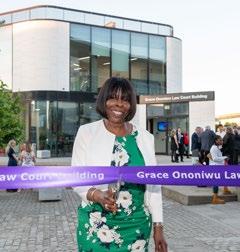
The unveiling coincides with the building’s 10th anniversary. It is home to the award-winning Hertfordshire Law Clinic, which provides free legal advice to the local community, and a full-scale replica crown court with a public gallery.
“ I am so proud to be recognised by the University of Hertfordshire and associated with one of the most diverse and inclusive Law Schools in the country. This building symbolises the start of my professional journey and its doors will remain wedged open for all future aspiring lawyers regardless of background or circumstance. Thank you for all of the support, it’s truly appreciated. ”
Dr Grace Ononiwu CBE
32 Powering Potential
The building’s new name is the Grace Ononiwu Law Court Building and is in recognition of Grace’s outstanding contribution to the legal and justice system, including her ongoing work promoting legal education.
The first university to launch new barrister courses since 1997
We have been authorised by the Bar Standards Board (BSB) to provide barrister training, the first time a university has received approval in nearly 25 years.
One of only 10 universities in the UK offering this training, we deliver two vocational programmes, the PgDL Bar Practice and LLM Bar Practice.
Our bar programmes provide flexible and accessible training, delivered by current and former barristers, industry professionals and leading researchers. Students have the opportunity to gain invaluable, real-world experience during their course, including working for the Hertfordshire Law Clinic and alongside our industry partners.
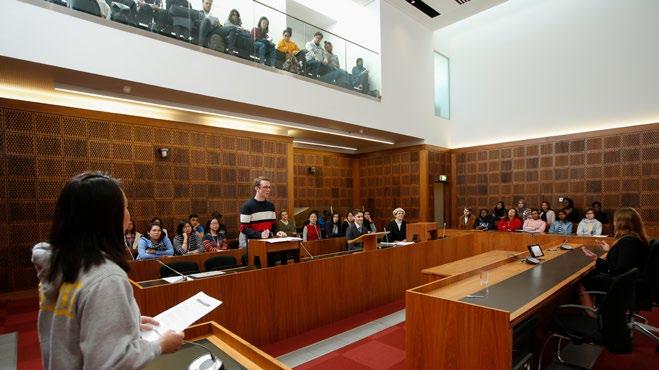
Digital bar practice has become more common in courts across the country, particularly during the pandemic. To ensure students have the right skills and experience when they graduate, our in-person teaching is supported by digital training resources, making use of the latest technology and our law facilities. Students practice their trial advocacy skills in the Law School’s full-scale replica crown court, under the supervision of experienced lecturers, including two former crown court judges.
“ This is a significant achievement for the University and Hertfordshire Law School, and builds on the outstanding academic and professional legal education we have been delivering successfully for more than 45 years. ”
Penny Carey Dean of Hertfordshire Law School
33
Celebrating the success of our students
Our students are passionate about improving people’s lives and have received the award of Best Contribution by a Team of Students at the prestigious Law Works Student Pro Bono Awards 2022, celebrating their contribution to helping vulnerable people at risk of homelessness in Hertfordshire. The ceremony at the House of Lords recognises the best pro bono activities undertaken by law students across the country, and the positive impact their work has on the people they have assisted.
The student team were rewarded for their work with Shelter on the Court Desk Volunteer Scheme which sees student volunteers attending courts on a weekly basis to support Shelter’s in-house solicitor, helping people who face losing their home as a result of housing repossession. Their voluntary work included triaging cases, helping with the completion of legal aid paperwork and facilitating communication between clients, solicitors and ushers in court.
“ People who come to court are often extremely anxious with fear of the possible outcomes. The students help to put tenants at ease by ensuring that they are seen quicker, and they understand the process and how we can help. Over the last year the students have learnt so much about the law and have impressively enhanced their skills. It is an honour to be given this award in proper recognition of the great work by our team of students.
 Ruth Camp Solicitor, Shelter
Ruth Camp Solicitor, Shelter
”
34 Powering Potential
We were also shortlisted for Best New Pro Bono Activity, for the Young Asylum Seekers Legal Advice Clinic, and Highly Commended in Best Contribution by a Law School for the impact and scope of its pro bono activities.
Future aspirations
Hertfordshire Law School is passionate about responding to the challenges of the changing world and supporting the local community. Expanding the services of the Law Clinic will continue to benefit the community. These services include a new family law clinic at HMP The Mount, and a new Access to Justice clinic, providing support to vulnerable young people in partnership with the charity Just for Kids. Students will also have the opportunity to count their experience in the Law Clinic as Qualifying Work Experience, helping them qualify as a solicitor more quickly under the new Solicitors Qualifying Examination (SQE) route.
In delivering flexible education to meet regional and national needs, we plan to launch a new professional policing degree to complement our existing strengths in law and criminology.
From 2023 we will also be offering the LLM Solicitors Practice, preparing students for the SQE.
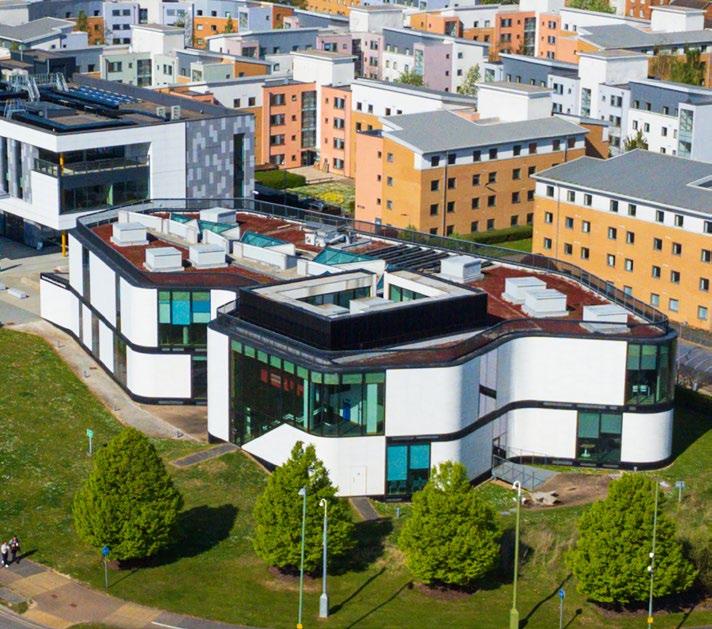
35
Grace Ononiwu Law Court Building
School of Creative Arts
Subject areas Architecture Art and Design Fashion Film, Digital and Animation Music, Performance and Production Photography


I want our students to love their time here. We encourage them to be free to explore, experiment and create amazing work in an inspirational, supportive, friendly and ambitious art school environment, then to go on to glittering careers and achieve their dreams.
 Dr Mairi
Dr Mairi
Watson Interim Dean of the School of Creative Arts
36 Powering Potential
100% overall student satisfaction for Photography

National Student Survey 2022
Ranked 1st in the UK and 20th in the world for Top 50 Creative Media and Entertainment Schools and Colleges
2022 Rookie Awards
Won three student awards
at the 2021 TIGA UK Games Education Awards
Our vibrant School of Creative Arts provides an inspiring and supportive environment for our students and staff to thrive. Our film, media, design, visual arts, music and art therapy courses are led by talented artists, experienced lecturers and industry experts. The School houses exceptional facilities, including television and photography studios, sound control rooms and post-production suites.
Fundamental to the success and delivery of our courses are our ‘live projects’, which are based on industry led professional briefs and help us place our students in the world of work enabling them to gain valuable industry experience before graduating.
No less fundamental is our world leading and internationally excellent research in the fine arts, in architecture, in art and design history, in media studies, heritage, and zero carbon design. Working with our team of Doctoral students, our experts lead the way in building our understanding of the challenges of past, our present and crucially our future!
To help our students build professional connections, they have the opportunity to visit our partners from around the world. This support has led to national and international recognition and industry placements with companies that include Ted Baker, Sony, Tesco, Norman Foster and partners and Warner Brothers.
37
Our experts are changing lives
Silvio is a trained architect, and Head of Art and Design. His research focuses on the application of technology and computational design to improve the physical environment to encourage positive societal change. He applies AI, automation and intelligent systems technology to the design of both interior and urban spaces. A recent care home project using AI and automation has focused on detecting and minimising airborne transmission of pathogens of particular relevance in the Covid-19 pandemic. Silvio’s research uses AI to measure the resilience of communities and to visualise their path to net zero and helps build a compelling vision for the future — building smart cities that are financially and environmentally resilient by design, and helping people respond to crises and live comfortable, happy and sustainable lives.
Shaun is Associate Dean of Business, Innovation and Projects, and is Head of the Digital Hack Lab, In Pursuit of Luxury and Creative Ideas in the School of Creative Arts. He is interested in design led innovation where design comes first — not as a service to fulfil a business strategy but as a visionary path where design is considered to be an intrinsic part of decision making. This invites a new kind of multi and trans-disciplinary collaboration from around the world. He also works as an independent consultant to luxury brands and associations around the globe. He is a regular keynote speaker at events around the world as an authority on luxury branding and fashion, consumerism and brand strategies. Shaun’s research explores how technology is changing the perception of the hand made in the context of how luxury brands have grown as a result of being able to supply historically hand crafted products en-masse through technological innovation.

Lubo is Professor of Advanced Building Design at the School of Creative Arts, and Director of the University-wide Centre for Future Societies Research, in which over 90 academics and researchers investigate complex ways of making our future world a better place. As Director of Zero Carbon Lab, he leads interdisciplinary research that combines design thinking and advanced computer modelling methods to seek solutions to open problems in the urban environment. In his impact driven research and engagement with policy makers, he has worked with local authorities in Hertfordshire on the development of the climate emergency response policy and the buildings decarbonisation policy, helping them with a strategy to achieve net zero emissions. He has also worked on urban modelling nature inspired net zero building design, the Architecture of biologically grown buildings to achieve buildings with net zero emissions within the first half of this century. He has published widely on the results of his research and is working on a third edition of his book ‘Designing Zero Carbon Buildings: Embodied and Operational Emissions in Achieving True Zero’, to be published by Routledge in 2024.


Scan or click on the link below to find out more about Lubo's research go.herts.ac.uk/lubo

38 Powering Potential
Dr Silvio Carta ARB
Dr Shaun Borstrock
Professor Lubo Jankovic
Sam Jury

Sam, leads the Art Sci Lab with artist and theorist, Dr Alana Jelinek. Sam's research includes the impact of slow violence and trauma in post-conflict situations, and she is working with University of Hertfordshire psychologists on a project exploring repetition with those who have Tourette's Syndrome. She is currently Principal Investigator on AHRC Network Grant, Visual Arts and Theatre Collaboration New Models for Art Practices in post-conflict situations and won the prestigious Arts and Humanities Research Council Research in Film Award in 2019.
Grace is Professor of Design History, and Director for DHeritage, the Professional Doctorate in Heritage. She is Chair of the Editorial Board of the Journal of Design History (Oxford University Press) and founding coseries editor of Cultural Histories of Design (Bloomsbury). Grace’s research on the mediation of design encompasses national identity, globalization and domesticity. She is author of Design at Home: Domestic Advice Books in Britain and the USA since 1945 and co-author with Nicolas P. Maffei of Reading Graphic Design. She edited Writing Design: Words and Objects and Iconic Designs: 50 Stories about 50 Things and co-edited Made in Italy and Designing Worlds with Kjetil Fallan (University of Oslo, Norway) and Design and Heritage, and The Design History Reader with Rebecca Houze (Northern Illinois University, USA). Grace led the Theorising Visual Art and Design Research Group at Hertfordshire from 2004 to 2018.


39
Professor Grace Lees Maffei
Our inspiring alumni
Bre is an International Product Manager at music label AWAL, working with marketing teams around the world to execute campaigns for independent artists.
Bre previously worked in International Marketing at Sony Music UK, where she also headed up their diversity and inclusion committee, HUE UK – a title that won her a no.14 position on the Yahoo! Finance x The EMpower 100 Ethnic Minority Future Leaders 2021 list.

“ There was something about Hertfordshire's culture on campus and culture amongst the students that I was really drawn to. I was actually set up and ready to go to another university who had a similar course, but had a last-minute change of heart, so applied for Herts through clearing. To this day, I'm not quite sure what gave me such conviction to change my mind, but I trust that it was all meant to be and I'm SO happy I did it. ”
BSc (Hons) Music Composition and Technology in Film and Games, 2020 Music Composer, TOEM
TOEM was developed by Something We Made Games in 2021 for Nintendo Switch, PlayStation 5 and PC. It is entirely hand drawn, with players embarking on an expedition to uncover mysteries.
“ I've been waiting for that feeling we got backstage after we won to wear off, but I guess it won't! You only get one shot at winning Debut Game and that makes it so much more exciting!

Now is the best time to remain level-headed and pragmatic about the future, but I also want to remain ambitious, and I'd like to return to the BAFTAs to take home the award for Best Original Score and why not throw in a Grammy and an Oscar for good measure. ”
Since graduating, Jamal’s career highlights include composing for the action-packed platform game Skelattack in 2020 and being featured on Sony Masterworks & Milan Records Black Music Month.
40 Powering Potential
Bre McDermott-King BA (Hons) Music Industry Management, 2018 International Product Manager at AWAL
Jamal Green
Music composer Jamal is part of the team that won Best Debut Game at the BAFTA Games Awards 2022.
Research

At the School of Creative Arts, we carry out research that transforms lives addressing fundamental global, societal and cultural challenges. How, for example, do the arts help us glean insights into the sciences, how might we design our cities and homes more sustainably, how does our past impact on the present and what should we do to protect it? Our artists and musicians, our art and design historians, our architects, planners, AI experts, filmmakers and media experts are working with our local, national and global communities to answer some of these questions to help us understand our place in an increasingly uncertain world.
Art Sci Lab
Our Art Sci Lab brings together artists, performers, musicians and filmmakers and scientists working in everything from speculative physics, material and life-sciences to the social sciences to explore ways in which the arts can give us new insights into the sciences and how science can help us see the arts in a new light. We work with curators, scholars, scientists, policy makers and industry to help us explore a range of different cultures and perspectives. As with everything we do, we are committed to sharing and co-creating our research to benefit society.

The Games and Visual Effects Research Lab
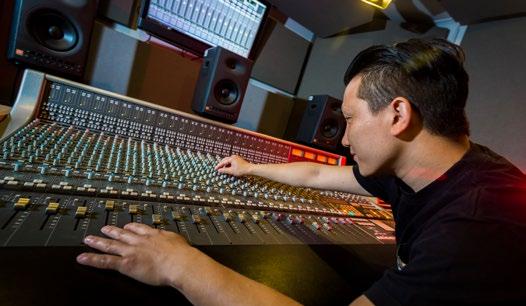
Our Games and Visual Effects Research Lab brings together the expertise of a wide range of film, media, VR, augmented reality, animation and special effects specialist to develop new and more efficient ways of harnessing and combining technologies to support the local film and media industries. G+VERL’s unique environment offers teams of students and multidisciplinary researchers state-of-the-art computing technology to help facilitate and increase research and development for the VFX and games Industries. G+VERL is part of a multi-disciplinary centre of excellence for research, and for business and social engagement, in the creative industries and the broader creative economy.
Scan here or click on the link below to find out more about our research expertise go.herts.ac.uk/ herts-research

41
Future research plans

The School of Creative Arts aims to build on our formidable track record of world-leading and internationally excellent research, and sharing that research with the world at large. We secured major investment from the Arts and Humanities Research Council to work with stakeholders in heritage, in the arts, film and media, and we plan to work with local agencies and organisations to support the development of film and media industries both locally and globally. Climate emergency is a touchstone in all our work, and our architects and data scientist responsible for our Zero Carbon Lab and our Future Societies Research Centre will build on our work with local councils to collaborate to find sustainable ways to live.

42 Powering Potential
Future aspirations
We continue to transform the economy and our communities through driving expertise in business, innovation and skills and offering flexible ways for businesses to work with us.
Supporting small businesses
Propeller Creative

Through our internal design agency (Propeller Creative), we provide our local businesses and new small businesses in the University’s Enterprise Zone with the opportunity to work with our talented students, graduates, staff, and external industry experts.
The agency works across multiple design disciplines, which provides businesses with the flexibility to take on unusual or large-scale projects that cross boundaries. From branding to interior architecture, film production and interactive experiences Propeller Creative draws on the experience and expert knowledge housed within the School to create inspirational, professional design solutions. For more information: propeller.herts.ac.uk/about-us
Digital Hack Laboratory
The Digital Hack Laboratory is a research unit that investigates the impact technology is having on creative practice. The diverse expertise of the team enables specific research areas to be tackled while realising the opportunity for innovation, encouraging change through new thinking offered by digital technologies. For more information: herts.ac.uk/digitalhacklab/digital-hack-lab
Media production
Video, audio, and high-quality image skills are important for all small companies but many do not have the funds to make use of the huge potential that digital media platforms and apps offer. We provide technical support, equipment hire, and training for small business to help them produce materials and develop their in house skills.
43
School of Health and Social Work
Centre for Research in Public Health and Community Care (CRIPACC)
Subject areas Adult Nursing
Children’s Nursing Diagnostic Radiography Learning Disabilities Nursing Mental Health Nursing Midwifery
Occupational Therapy Paramedic Science
Physiotherapy
Primary Care (Specialist Community Nursing and Specialist
Community Public Health Nursing)
Radiotherapy and Oncology

Social Work
Our School is committed to unlocking the potential of each individual student, to provide them with the skills to go into the world to improve lives – to do things that really make a difference. We are partners in their journey, working to ensure their learning experience is the very best that it can be.
Professor Jackie Kelly Dean of the School of Health and Social Work

44 Powering Potential
The School of Health and Social Work delivers innovation and excellence across a diverse range of health and social care education and research, positively impacting on our local, national and international communities. Our strong industry partnerships keep us at the cutting edge of health and social care and our practice partners offer excellent student placement experiences. Together, we transform the lives of our students, enabling them to graduate with confidence into the workforce, applying their skills and expertise to improve lives and safeguard futures for all.
The School consists of two academic departments and an internationally renowned research centre. We have more than 5,000 students and through our evidence-based teaching we support and create opportunities to build our students’ confidence and develop their skills in their chosen profession. We offer courses across undergraduate, postgraduate and research degree level, as well as continuing professional development for those wishing to enhance their skills, further advancing their careers.

We are ranked 2nd for Social Work in the Guardian University Guide 2022
We are in the top 5 in the UK for Paramedic Science according to the Complete University Guide 2023
45
Our graduates have received British Empire Medals for work on the frontline during the pandemic, and services to humanitarian work
Our experts are changing lives
Michael specialises in the teaching of children and young people’s public health nursing and is motivated by maximising the student experience and the translation of knowledge and evidence into health visiting and School nursing practice and policy. His research interests identify knowledge and evidence needs for contemporary public health practice as well as policy and practice responses to ethically challenging social issues.

PhD, PGDip, PGCert, BSc (Hons), RN(Adult), SCPHN(HV), FHEA
Michael was a co-investigator on a qualitative research project gaining insight into food, nutrition and diet practices in the maternal and early years period. He has also co-edited a book entitled ‘Digital Connections in Health and Social Work: Perspectives from Covid-19’ (2022, Critical Publishing Ltd), that presented 13 case studies of various experiences from health and social work educators, leaders, practitioners and students during the Covid-19 pandemic.
Dr Jennifer Lynch

PhD, MA, MSc, PG Cert. Advanced Research Methods, BA (Hons)
Jennifer is a Reader in Social Care Technology and Knowledge Mobilisation with a background in adult social care commissioning. She has an overarching research interest in social care and community-based health and wellbeing provision, with a particular focus on technologyenabled care. She is a recent NIHR Knowledge Mobilisation Research Fellow (2018-21) working with local authorities as they embed assistive technology into their social care offer and tackle challenges of scale-up, spread and sustainability. Her research is concerned with developing knowledge mobilisation capacity by considering how different forms of evidence and diverse perspectives can be brought together to catalyse change in complex health and care systems.
Scan or click on the link below to find out more about Jennifer’s research go.herts.ac.uk/jennifer
Professor Daksha Trivedi

BSc (Hons), MSc, PhD (Lon), MPhil (Cantab)
Daksha is a Professor of Applied Health Research. She trained as a scientist and has an interest and expertise in Mixed Methods, Clinical Trials, Complex interventions and Evidence Based Practice. She is the University’s lead for the Mental Health Over the Life Course Theme, National Institute for Health and Care Research (NIHR) Applied Research Collaboration (ARC), East of England, and has led NIHR funded research across various public health areas.
She is an Editor for the Cochrane Injuries Group, Associate Editor for Primary Health Care Research and Development, and member of the NIHR Research Patient Benefit Regional Advisory Committee. Daksha is a Co-chair of the Hertfordshire Public Health Connect Strategy Group and is leading various NIHR ARC related projects addressing health inequalities.
Scan here or click on the link below to find out more about our research expertise go.herts.ac.uk/herts-research


46 Powering Potential
Dr Michael Fanner
Continued investment in teaching and learning facilities
Simulation is an essential component of our healthcare programmes where students can practice true to life procedures, skills, and scenarios in a realistic yet completely safe environment. We have first class facilities in our physiotherapy and paramedic skills laboratories, radiography labs, CT scanner, ultrasound labs and activities of daily living areas for occupational therapy.
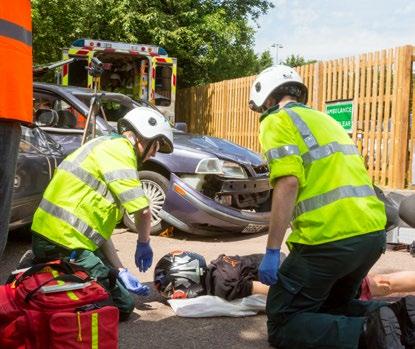
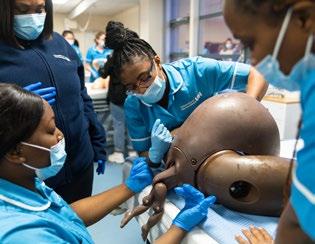
In our nursing and midwifery simulation centre the maternity room is fully equipped for water birthing and home births, and there is a hospital delivery suite with manikins capable of simulating challenging deliveries and emergency procedures. Within our neonatal care setting there are baby manikins supported by fully equipped hospital incubators.
High-definition video recordings using Smots™ technology give students real time feedback on their performance. Virtual reality headsets immerse students in a hospital setting where they interact with artificial intelligence driven patients and clinicians. We are currently working with Oxford Simulation to deliver new and innovative ways of learning.
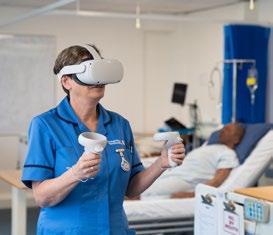
Scan or click on the link below to view our amazing facilities go.herts.ac.uk/ hsk-facilities

47
Research
Enhancing research capacity in adult social care in the East of England
Over one million adults in the UK receive personal and practical care and assistance from social care for a wide range of reasons, including critical support for age-related issues, health conditions, and disabilities. In partnership with Hertfordshire County Council and Norfolk County Council, our researchers will establish four new Social Care Research in Practice Teams (RiPTs). The team members will receive funding to enhance their research skills and confidence, and to design and implement new research projects to advance social care in the region.
Supporting person-centred care for people with dementia in hospital settings

Approximately 40% of older people admitted to hospital have dementia. People with dementia who need to stay in hospital must be treated with dignity and understanding as they are often not able to articulate important information about their symptoms, or how they feel.
The purpose of the project is to design an intervention to make constant observations in hospitals more person-centred, ensuring that dementia patients are treated with dignity and receive the best care possible.
Beyond Words: Co-creation and evaluation of a resource to support Covid-19 vaccine uptake in people with intellectual disabilities
Public Health England reported that individuals with learning disabilities are up to six times more likely to die from Covid-19, so empowering this group of people to get a vaccine is essential. People with learning disabilities are significantly impacted by health inequalities and recent data regarding the impact of Covid-19 has highlighted the increased vulnerabilities of this group.
The aim of this project was to develop a picture book, working with Beyond Words, for people with learning disabilities that explains in pictures about having the coronavirus injection.
Public Health Intervention Responsive Studies Teams
Our team of researchers who make up one of the six National Institute for Health and Care Research (NIHR) Public Health Intervention Responsive Studies Team (PHIRST) are working in partnership with local authorities to carry out evaluation research with the aim of improving public health. By having these established teams in place, the NIHR can drive timely evaluations of important public health services.
48 Powering Potential
Future research
To complement the established research programmes within our Centre for Research in Public Health and Community Care, we have launched two new research units that aim to become research centres within the next 5-10 years.
The Musculoskeletal Research Unit (MSK-RU), led by Dr Catherine Minns Lowe, collaborates with other research groups nationally and internationally to produce high quality research. Their research involves people living with musculoskeletal conditions. They also support clinicians who are keen to become active researchers and NHS Trusts and groups to evaluate and improve care.
The Paramedic Clinical Research Unit (ParaCRU), led by Professor Julia Williams, aims to build research capacity and capability among paramedics to empower the profession to influence changes in service delivery, patient care and management as well as patients’ clinical outcomes in the years ahead.
Research Degrees in Health
Our postgraduate research programmes capitalise on interest and need for high quality health and care research with our NHS and local authority partners.
Our programmes include two professional doctorates, the Doctorate in Public Health (DrPH) and the Doctorate in Health and Social Care (DHaSC), as well as a vibrant PhD programme across all professions and disciplines within the school.
These innovative programmes enable UK-based and international senior clinicians, managers and public health specialists to undertake postgraduate research supervised by our multi-disciplinary teams.

49
Williams PhD, BSc (Hons), FCPara, FEA Associate Dean of Research
Centre for Research in Public Health and Community Care (CRIPACC)
CRIPACC is an internationally renowned multidisciplinary research centre focused on producing research that makes a difference to people’s lives by improving the quality of health and social care services and promoting health and wellbeing. Our key areas of research activity include:
∙ Communities, Young People and Family Lives
∙ Older People’s Health and Complex Conditions Patient Experience and Public Involvement
National Institute of Health and Care Research (NIHR) Applied Research Collaboration (ARCs)
The University leads three research themes of the National Institute of Health and Care Research (NIHR) ARC for the East of England. ARCs are funded to support applied health and care research that responds to the needs of local populations and local health and care systems. CRIPACC is leading on the following three research themes:
Ageing and multi-morbidity: Led by Professor Kathryn Almack Prevention and early detection in health and social care: Led by Dr Claire Thompson
∙
Inclusive involvement in research for practice led health and social care: Led by Dr Elspeth Mathie from the University and Professor Fiona Poland from the University of East Anglia
Julia is Professor and Research Lead for Paramedic Science and Associate Dean of School (Research).
She has extensive experience of undertaking research in a variety of healthcare settings. She is also involved in the development and delivery of higher education courses both for already qualified paramedics and also for students on pre-registration paramedic science programmes.
Julia also works with South East Coast Ambulance Service NHS Foundation Trust where she undertakes clinical research as well as clinical practice as a paramedic, which she considers essential to enhance the currency of her clinical research as well as her teaching.
As Head of Research for the College of Paramedics (UK), she is committed to increasing the capacity and capability of paramedics within clinical research.
Wendy is Professor of Food and Public Health, and Director of CRIPACC. Her research focuses on the socio-economic determinants of health and wellbeing particularly in relation to obesity, food practices and malnutrition; she has a particular interest in how inequalities are experienced by different population groups.
Wendy Wills PhD, MSc, BSc (Hons), SFHEA, RNutr (Public Health)

Wendy has recently been appointed as the Director of the NIHR ARC for the East of England, having previously led their Prevention and Early Detection in Health and Social Care (PEDHSC) theme. She was also joint Chief Investigator for the NIHR Public Health Intervention Responsive Studies Team (PHIRST).

50 Powering Potential
Professor Julia
Professor
Our inspiring alumni
Jess is the clinical lead for respiratory physiotherapy at Whittington Health NHS Trust and co-led the Continuous Positive Airway Pressure services for Covid patients. She has been awarded a British Empire Medal (BEM) for her work at the hospital on the frontline of the pandemic.
“ I am beyond grateful and overwhelmed to have been awarded a BEM. Although it was an extremely difficult time and we all worked in ways we could never have imagined, I am immensely proud of all of the therapy department who provided the best care we could for our patients. ”
Becky is an Advanced Clinical Practitioner at the Royal London Hospital, with more than 23 years nursing experience. She is a recipient of the British Empire Medal (BEM) for Services to Humanitarian Response.



She was a key team member in the UK Emergency Medical Team’s response to the diphtheria outbreak in Bangladesh in 2017 and the measles outbreak in Samoa in 2019.
Becky is currently deployed in Ukraine with UK-Med to provide medical help to the thousands of displaced refugees.
51
Jess Horne BSc (Hons) Physiotherapy, 2013
Becky Platt
MSc Contemporary Nursing, 2020
Future aspirations
Our focus is to respond to the many healthcare challenges through the development of new programmes and investment in the latest technological innovations. This year we intend to: ∙ enhance and develop the research rich environment in CRIPACC, across the Departments and within the Research Units ∙ introduce RN Degree Apprenticeship top-ups; further develop advanced clinical practice and enhance our CPD offer in line with service needs ∙ explore the potential for developing new programmes within the International franchise Global Academic Foundation initiative ∙ develop new pre-registration MSc programme pathways following recent developments in Physiotherapy and Radiography

52 Powering Potential
Prioritising inclusivity
Our school is committed to building a positive inclusive culture, creating a community based on dignity and respect, across academia for all students and staff. Through the work of the school’s Equality, Wellbeing and Inclusivity Committee we are committed to embedding fairness, ensuring our students and staff have a voice and feel empowered to be successful. We are proud of our Athena SWAN Silver status, confirmed in 2018, which acknowledges our ongoing commitment to gender equality.
Responding to business needs
Apprenticeships
We are committed to working with and supporting businesses through our health and social care apprenticeships. Our most recent programmes are:
∙ MSc Physiotherapy pre-registration MSc Radiography pre-registration
∙ Nursing Associate Higher Apprenticeship
∙ Occupational Therapy degree apprenticeship programme Degree Apprenticeship in Learning Disability Nursing
∙ Apprenticeship pathway for the MSc Advanced Clinical Practice
Public involvement
Our school is proud of its work and commitment in this area, through its well-established Public Involvement in Research group (PIRg) and its Service User and Public Involvement (SUPI) panel. These groups employ experts by experience to ensure our research and teaching are developed, shared and co produced remaining relevant to population needs.
Generation R young people improving research
YPAGs (Young People’s Advisory Groups) have been set up to ensure that children, young people and families are actively involved in the design and delivery of clinical research. The University’s YPAG is led by Dr Louca-Mai Brady, Senior Research Fellow. Louca-Mai’s research interests include research with children and young people, public involvement, young people’s participation in health and social care research and services and qualitative and participative research methods.
Honorary Visiting Professors
The strength in our partnerships with our health and care stakeholders plays a critical role in our success. The sharing of information, practice and research makes a significant impact on the health and wellbeing of our communities. This is recognised through our collaborations with our Honorary Visiting Professors, including: Professor Jim McManus, Director of Public Health for Hertfordshire through Hertfordshire Public Health Connect; Professor Oliver Shanley OBE, and Professor Chris Goddard, Adjunct Research Professor, Education Futures Unit, University of South Australia, Member of the Advisory Board for the International Journal of Children's Rights and Editorial Consultant for Children Australia.
53
School of Life and Medical Sciences
Subject areas Agriculture Biological Sciences Geography, Environment and Planning
Postgraduate Medicine and Public Health Nutrition and Dietetics
Optometry Pharmacy and Pharmaceutical Science Psychology
Sport, Health and Exercise
We are a diverse School of science and everything we teach here, from town planning to optometry, is applied science - we take what we learn and use it to bring something useful to society.
We’re also a research-intensive School, with more than 300 research and postdoctoral students. Everything we teach is informed by up to date, innovative research.
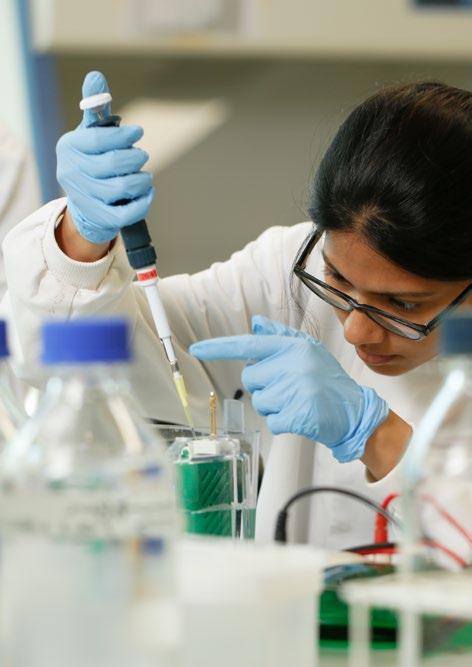
 Dr Richard Southern Dean of the School of Life and Medical Sciences
Dr Richard Southern Dean of the School of Life and Medical Sciences
54 Powering Potential
Guardian University Guide 2022

Research Excellence Framework 2021
100% overall student satisfaction for Pharmacology
National Student Survey 2022
Through our exceptional teaching and research, innovative facilities, and life changing courses, the School of Life and Medical Sciences prepares talented new scientists, health practitioners, and leaders in the field to tackle the most pressing issues facing our world today.
Our outstanding Science Building is home to spacious new laboratories and learning spaces, and offers research technologies including pharmaceutical manufacturing equipment, cell culture facilities and aseptic suites for our students and the wider community.
From our medical simulation suites, optometry specialist clinics, and sports injuries clinic to our field station used for regular field work by our geography, environment and agriculture students, our facilities enrich the curriculum and prepare our students for the future.
We are ranked 14th for Geography and Environmental Studies
Psychology ranked joint first nationally for research impact, obtaining 100% outstanding rating
55
Our experts are changing lives
From tackling climate change to helping ensure food and information security, our experts are committed to protecting people and the planet by finding innovative and sustainable solutions to the most critical social, environmental and economic challenges facing society today.
Dr Joy Myint
PhD, MA, BSc (Hons), FCOptom, Prof Cert LV, PG Cert(AP), FHEA Head of Optometry
Joy is recognised for her work in optometric education and was awarded a Fellowship by the College of Optometrists for her endeavours in this field. She is recognised both nationally and internationally for her work with Paralympic Sport Classification for Visual Impaired Athletes, both as a classifier and a researcher, including establishing a new evidencebased system of classification for shooting. She holds positions on several external panels and committees including for the General Optical Council and the College of Optometrists. Joy is an invited Liveryman of the Worshipful Company of Spectacle Makers.
Dr Victoria Hutter

MPharm, PhD, FHEA Associate Professor Research, Team Leader Pharmaceutics, Principal Lecturer Clinical Pharmaceutics
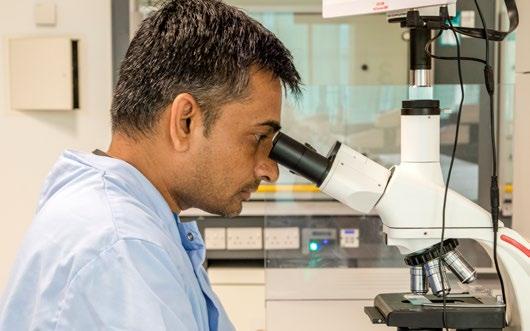

Victoria is an expert in drug delivery and in vitro toxicology, focussing on designing new animal-free tools and methodologies to assess the safety and efficacy of inhaled products. Victoria has developed patented technologies for human immunocompetent ‘organ-in-a-dish’ systems and has successfully commercialised these as co-founder and Chief Scientific Officer of ImmuONE and ACellZ. These technologies provide a human relevant system for product/medicine screening to reduce and eventually replace the requirement for animal testing. Additionally, she has raised over £7 million of research funding and currently leads a large international consortium to adapt OECD test guidelines to be free of animal products.
Scan or click on the link below to view more about our research expertise
go.herts.ac.uk/ herts-research

56 Powering Potential
Professor John Sturzaker

FRTPI Programme Lead for Sustainable Planning

Professor Sturzaker is the first Ebenezer Howard Professor of Planning, a post created to reflect the rich history of innovation in planning in Hertfordshire. Professor Sturzaker’s work builds on this history, focussing on the challenges of planning for, and delivering more sustainable urban growth. He works with partners in the public and private sector, exploring issues such as the translation of planning policy into outcomes on the ground, and public engagement with planning. Recently he led the Rural Planning in the 2020s project with the Royal Town Planning Institute, feeding into debates on land use and sustainability.
 Professor Katherine Brown PhD, C.Psychol, FHEA
Professor Katherine Brown PhD, C.Psychol, FHEA
Professor Brown is a fully qualified Health Psychologist registered with the Health and Care Professions Council, and specialises in the development and evaluation of public health interventions. She is an expert in the application of the theories and methods of behaviour change science, and use of digital platforms in intervention design. She has collaborated with a range of health industry partners including pharmaceuticals, technology and IT companies, third sector service providers, NHS trusts, local authorities and their partners. She is interested in enhancing existing public health and care pathways through the application of behavioural science.
57
Our inspiring alumni
Levon is currently working as the Assistant Head Coach at the Barcelona Football Academy at one of the four existing centres in the city. While in the UK, he gained as much coaching experience as he could in different sports, which enhanced his CV and landed him a job at Barcelona.

BSc Sports Studies, 2016 Assistant Head Coach, Barcelona Football Academy, Mumbai
“ Initially, I struggled to adapt as it was extremely challenging, but eventually, I found my footing, which helped me get a promotion to assistant head coach six months into the job.
My time at the University taught me a lot, which helped craft and mould my career into what it is today. Learning the intricate details about the different fields in sport helped me adapt and cope with the demands to perform at a higher level. Being an international student, I was treated very warmly and communication was swift and easy, which made the decision even easier. ”
Chika has used her business knowledge to help others. She is currently the Chief Executive Officer of Greymate Care, Africa’s pioneer AI-Powered, home care platform that connects the elderly to a vetted caregiver.
Chika Madubuko MSc Biotechnology, 2014 Founder/Chief Executive Officer, Greymate Care

“ The experience garnered over the years as a business development executive across three continents in multinational companies prepared me for this role.
Our courses were delivered using a problem-based learning approach where we tried to find solutions using real-life scenarios as case studies. ”
In June 2020, at the University’s Vice-Chancellor’s Awards, Chika was awarded our International Alumnus/Alumna of the year.
Nikunj has been working at Tesco since he was a Pre-registration Pharmacist and has worked his way up to the position he is now in today. Through the University’s resources, facilities and exceptional pharmacy degree, Nikunj had the opportunity to train three pharmacists as a preregistration tutor. This hands-on practical experience helped him when entering employment and gave him tangible skills to take into his career.

Nikunj Thakrar Pharmacy, 2009
Pharmacy Manager, Tesco and Visiting Lecturer, University of Hertfordshire
“ The University had, and still has, a massive impact on how my career has progressed. The teaching, support and resources were excellent and helped me develop into the pharmacist I am today. I count my time at university as one of the main contributing factors to my success. ”
Levon D’Souza
58 Powering Potential
Institute of Sport provides leading teaching, learning research and consultancy facilities
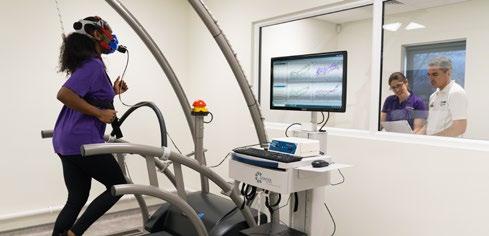
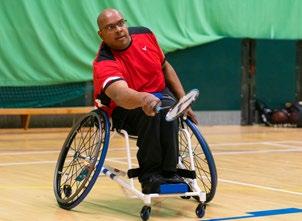
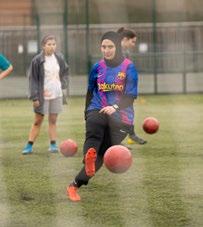
The University is committed to providing a sporting environment that nurtures exceptional talent, and we are continually improving our teaching, research and facilities in this area to increase our sporting profile, and transform lives.
Our new £7.8 million Institute of Sport on the de Havilland Campus, provides outstanding facilities for students, staff, local communities, sport, health and exercise professionals. Just over half of the funding for the new building was provided by a Local Growth Fund investment from Hertfordshire Local Enterprise Partnership following a successful bid by the University.
The development, which is located adjacent to the Hertfordshire Sports Village, provides sport science laboratories, research space and equipment, flexible teaching and learning space, sports therapy clinics and office space. It also has facilities for existing programmes within Sport, Health and Exercise – including sport and exercise science, sports therapy and sports studies. The Institute will facilitate the delivery of a new Degree Apprenticeship in sports management.
Elizabeth’s research interests are physical activity and older adults, women and sport. She has published more than 50 research papers and books, delivered invited keynote presentations at international conferences on six continents, and written numerous commissioned monitoring and evaluation reports.
 Professor Elizabeth Pike
Professor Elizabeth Pike
Elizabeth was recently an invited member of an international conference that produced a multi-disciplinary consensus statement on the benefits of, and barriers to, physical activity for older adults. She is currently collaborating with Watford Football Club Community Sports and Education Trust on a reminiscence project for older adults living with dementia. She is co-founder of the Anita White Foundation, which provides education and development opportunities for women leaders and scholars in sport. She is also a former president of the International Sociology of Sport Association.
59
Professor of Sport, Health and Exercise
Research training programmes
Hertfordshire Knowledge Exchange PhD programme
The Hertfordshire Knowledge Exchange PhD programme is part of the Hertfordshire Science Partnership – a pioneering scheme that provides local and regional businesses with the opportunity to use our outstanding research facilities and access to a dedicated PhD research student. The following demonstrates the success of the exchange programme.
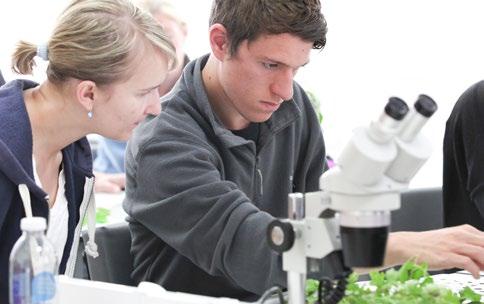
James Fortune PhD student
James is in his second year of his Hertfordshire Knowledge Exchange Partnership (HKEP) and has contributed significant research to the life sciences industry on behalf of specialist research and consultancy firm, ADAS. They specialise in the environmental, agricultural and rural sectors and James’ research to support ADAS is to investigate interactions between two fungal pathogens at different stages of their life cycles, and to develop new strategies for better control of both pathogens to reduce crop losses and improve disease modelling. The HKEP programme provides tailored support to enable businesses to carry out research and development work. James’ first year on the programme began with an initial year working in industry, where he was based at the ADAS offices in Cambridge. Here, he engaged in research consultation, managed projects and was able to immerse himself in the business.
“ When the University approached us to form the HKEP, we realised what a great opportunity it would be for the business in exposing students to our industry and the work we do at ADAS, as well as the fact that James’ project sits really well within our research interests, so we could see the value that he could bring to the work we already do. Since the project began, we’ve been able to use some of the findings from James’ project in presentations. He made a valuable contribution to other research projects whilst on placement with us and he’s developed new research methods that we can use within the business.
”
Faye Ritchie Plant Pathologist, ADAS
60 Powering Potential
EPSRC Centre for Doctoral Training in Aerosol Science
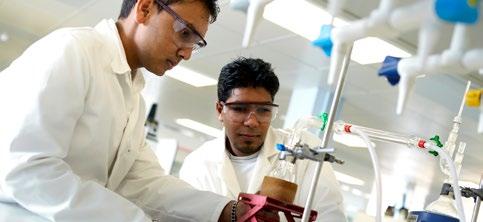
The University of Hertfordshire is a founder member of the EPSRC Centre, led by the University of Bristol, with the Universities of Bath, Cambridge, Imperial College, Leeds and Manchester. It is also the only centre for doctoral training in the engineering and physical sciences of aerosols in the UK. The centre has addressed the disconnect between typical training paradigms and contemporary research and engineering challenges, and offers a different approach to training the next generation of aerosol scientists. Many CDT scientists contributed to the UK's research efforts during the Covid-19 pandemic.
Altin is a PhD student investigating Invitro modelling of the lung’s response to environmental nanoparticulates. This will involve developing a standalone in vitro model that bridges the gap between traditional in vitro toxicology and in vivo toxicology, with the desire of reducing the need of animal models for nanoparticles toxicology and drug development.


As a result of high content cell imaging and analysis, Altin has obtained interesting morphometric data from lung epithelial cell lines exposed to nanoparticle and has developed automated analysis programmes using Python. He is excited and enthusiastic about the results of this analysis, and the progression of his research.
Toria’s PhD focuses on aerosol drug delivery to the lungs.
She is part of the first cohort of the CDT in Aerosol Science and her doctoral research investigates how the chemical and physical properties of aerosol medicines affect their interaction with water vapour and their subsequent deposition in the pulmonary system. The CDT programme has been an invaluable experience for her, with the initial training year setting her up for her PhD research by instilling her with the knowledge of fundamental aerosol properties, processes and measurement techniques. Furthermore, the CDT has provided her with access to webinars from a variety of subject experts and key support in her studies from colleagues in her cohort, academics associated with the course, and her industry partner.
Toria’s recent research has involved developing a computational model to account for the hygroscopic growth of pressurised metered dose inhaler droplets following inhalation, and to predict their regional and total deposition in the respiratory system. However, she is currently developing a microcrystalliser system capable of producing monodisperse drug particles, to further explore how drug particle properties influence their interaction with water vapour upon entering the pulmonary system.
61
Altin Kocinaj EPSRC CDT student
Victoria Legh-Land
Research
Smart mobility addresses the challenges of climate change

There is a growing need to find a solution to the climate emergency. The Smart Mobility Unit’s work is focused on developing applied research solutions collaboratively with industry and government in order to help address these issues from the perspective of public and personal transport. Current work includes local governance models, long term funding mechanisms, implementing multimodal through-ticketing, shared electric vehicle infrastructure and demand responsive transport solutions. Enabling people to move around efficiently using a variety of zero carbon solutions to create sustainable communities is an overarching aim of the Unit. This work is being developed using experimental projects across regions and in smaller scale demonstrator projects. These aim to share good practice as well as working collaboratively to inform learning.
What can a worm tell us about a human disease?
Dr Maria Dimitriadi, a Wellcome Trust funded Principal Investigator in the School of Life and Medical Science, is using a roundworm that shares many biological characteristics with humans to mimic Spinal Muscular Atrophy (SMA), an incurable condition. Dr Dimitriadi’s work will spark future research into developing effective therapies for SMA patients.
Urbanism research
The University’s Tarmac Sustainable Living Partnership has produced significant research on aspects of sustainable construction and placemaking. The University’s Memorandum of Understanding with Letchworth Garden City Heritage Foundation has enabled a wide range of partnership working in learning and research areas between the University and the world’s first garden city. These include the International Garden Cities Institute.
Through our planning, urbanism and transport staff, we have also developed an exciting partnership with the Laboratory for Building Cultures in France, at the École nationale supérieure d’architecture de Grenoble through which increasing collaborations in teaching and research are underway.
62 Powering Potential
Future research
At the School of Life and Medical Sciences we are committed to finding solutions to social, economic, and environmental problems. Through this commitment we continue to discover and formulate new medicines by forging stronger alliances between clinical and primary science researchers, and expand our portfolio to other areas of growth within our already successful areas such as Optometry.
Opportunities for staff development are encouraged by the University. A small group of staff from a clinical background have stepped away from the clinic to become academics because of their interest in teaching. Two members of staff are studying PhDs in Education – Academic Behavioural Confidence in Students on Clinical Programmes, and Learning Science with Understanding. Publications from these studies will add to the educational work taking place in the department. We will also have the opportunity to accept more research students, including members of staff in the field of science/clinical education.
Future aspirations
The University is contributing more than ever to future economic growth and to positive changes in the way we all live, work and learn. Our biosciences team are focused on supporting businesses to solve scientific problems in many specialist areas – infectious diseases, inherited genetic diseases, cancer, food spoilage and crop protection/sustainability, and bioinformatics. The diversity of services include consultancy, collaborative PhD studies, collaborative grant applications, and bespoke training for businesses and healthcare providers in key scientific technologies.
Through the Urbanism, and the Smart Mobility Unit, our School supports businesses and social enterprises through direct consultancy projects, such as memorandums of understanding, knowledge exchange partnerships, roundtables, applied research projects, research partnerships such as the Sustainable Living Partnership, and outposted academic directorships such as at the International Garden Cities Institute.
The expansion of short courses include the Aseptic Manufacturing course and the Health Simulation training, which provides the practical training needs of industry in the UK and overseas.
63
We continue to discover and formulate new medicines by forging stronger alliances between clinical and primary science researchers
School of Physics, Engineering and Computer Science

Subject areas
Aerospace Engineering Astrophysics
Automotive Engineering
Civil Engineering Computer Science
Cybersecurity Data Science

Electrical and Electronic Engineering Information Technology
Mechanical Engineering Mathematics Physics
Robotics and Artificial Intelligence Software Engineering
Physics, Engineering and Computer Science influence all aspects of our lives and help provide and maintain the modern high technology world that drives economies and society.
We prepare our students with the skills for that world so they can change lives!
Professor
Rodney Day Dean of Physics, Engineering and Computer Science
64 Powering Potential
Research Excellence Framework 2021
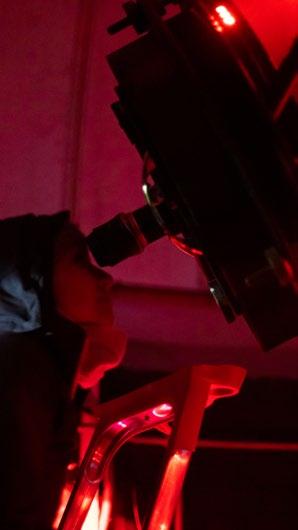

Our
The UH Racing Formula Student car team were the first British team to complete
Businesses, industry and the public sector need talented graduates that have the skills and advanced knowledge to work effectively in the modern, high technology world that drives economies and society. We focus on equipping students with the underpinning knowledge and practical skills to solve the challenges of our ever evolving world. They are taught by exceptional scientists, engineers, computer scientists and mathematicians who are at the forefront of their field.
Our courses are designed to reflect the needs of industry now and in the future, and are taught using facilities and equipment that include flight and driving simulators, cybersecurity and specialist robotics laboratories, electronics and physics laboratories. To enhance our facilities and transform the way we educate our students, the construction of a new sustainable building is taking place. Set across five floors it will provide students, staff and businesses with a hub for innovation, research and enterprise.
Computer Science saw 90% of its overall research ranked as world leading and internationally excellent, with 100% research impact ranked as outstanding
observatory is one of the UK’s largest and most extensive facilities for teaching observational astronomy
65
an event with an electric vehicle
Our experts are changing lives
From tackling climate change to helping ensure food and information security, our experts are committed to protecting people and the planet by finding innovative and sustainable solutions to the most critical social, environmental and economic challenges facing society today.
Geach Professor of Astrophysics


Professor Geach has a diverse, internationally outstanding research profile, with a focus on the evolution of gas in galaxies and the role of the environment in galaxy formation. James realised the potential of applying advanced machine learning algorithms developed for astrophysical use, to data from earth observation satellites. This has enabled him to accurately predict the full spectral response of the Earth’s surface from Sentinel’s Synthetic Aperture Radar which, contrary to observations in visible or infrared light, is unaffected by cloud cover. This opens up the prospect of being able to monitor, uninterrupted by, variable weather conditions such as crop health and growth.
Shabnam is a mathematician with a history of interdisciplinary research in computational neuroscience, theoretical physics, pure mathematics and software engineering. She studied mathematics at Trinity College, Cambridge, followed by a DPhil at the Mathematical Institute, Oxford.


She is actively involved in developing machine learning algorithms for the processing and analysis of very large datasets by experimental neuroscientists. A major challenge involved interpreting recordings of neuronal activity in the brain. When neurons fire, they produce action potentials or ‘spikes’ which are detectable on electrodes. Population recordings of tens of thousands of neurons are now feasible thanks to a new generation of large dense probes for electrophysiological recordings. Shabnam spearheaded the development of algorithms and software for spike sorting in the open source software suite, KlustaSuite, now incorporated into a new software suite, Phy, a tool that is widely used by hundreds of scientists worldwide in daily practice in over 300 laboratories.
Dr Baddoo’s research focuses on the relationship between developer motivation and software quality, software process improvement and software project performance. He was involved in a European initiative, with the European Network of Excellence to standardise empirical software engineering research. Nathan balances his highly inspirational teaching that has led to multiple nominations for our Vice-Chancellor’s awards, with his research in the area of software engineering. He is also one of our most experienced admissions tutors.

Associate Professor Xiao has
our students through her contributions to the School in the areas of learning and teaching in engineering, as well as developing strong networks within the wider higher education community.
Scarlett was awarded a highly commended Vice-Chancellor’s award for enhancing the quality of the student experience and the success of our graduates. Her case studies on re-engineering assessment for engineering education and capturing work experience and enhancing employability for engineering students were published by the Royal Academy of Engineering and the 1st High Education Academy STEM Conference as pioneering exemplars promoted across the higher education sector.
66 Powering Potential
created opportunities for
Professor James
Dr Shabnam Kadir Senior Lecturer
Dr
Nathan Baddoo Principal Lecturer, Computer Science
Scarlett Xiao Associate Professor
Scan or click on the link below to view more about our research expertise
go.herts.ac.uk/ herts-research
Professor Andreas Chrysanthou Professor in Materials Engineering
Professor Chrysanthou’s research expertise lies in the processing of materials. His early research established the thermodynamic and kinetic requirements for the production of silicon carbide whiskers from the carbothermic reduction of silicon dioxide. He participated in the FP6funded Network of Excellence in Knowledge-based Multi-component Materials (KMM-NoE). During the KMM-NoE project, together with Dr Anatolii Babutskyi, they initiated work on the use of electromagnetic fields as a processing step to extend corrosion resistance in metals. This investigation is now progressing as an FP7 Marie Curie project.
The KMM-NoE project has also led to further collaborative work with the Polytechnic of Torino and industry on the development of a new glassceramic sealant for solid-oxide fuel cells.
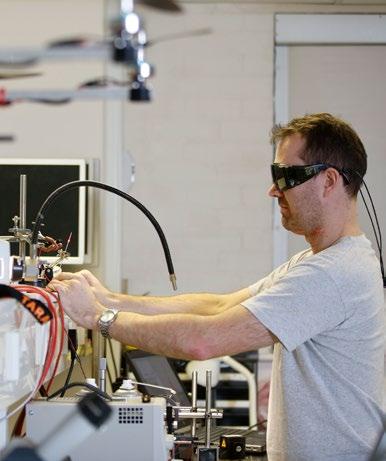
Andreas is a highly sought after academic by companies looking to improve their businesses by enhancing the performance or processing of materials. He is currently working on his eighth funded project with Cambridge based SME C4 Carbides; these have included three knowledge transfer projects and other projects funded by Innovate UK.
Our Knowledge Transfer Partnerships
Our commitment to supporting business is demonstrated through our dedication to the Knowledge Transfer Partnership programme (KTP). KTPs help businesses improve their competitiveness and productivity through the better use of insight, technology and skills that reside within the UK knowledge base. KTPs also form part of the Government’s Industrial Strategy.
C4 Carbides
We have contributed to C4 Carbides’ success. Our 10-year partnership led to several successful knowledge transfer partnership projects and Innovate UK funding. The relationship has transformed C4 Carbides from a niche manufacturing small and medium-sized enterprise to a global leader in the diamond cutting sector, with a profit directly attributed to its research partnership with the University of more than £11.5 million.
Manor Pharmacy Group
Artificial Intelligence experts from the University are working to help Manor Pharmacy Group with their health and lifestyle service that analyses each client’s health information and returns highly individualised lifestyle recommendations. Utilising a machinelearning approach to collecting and processing data via a personalised app will allow the service to scale-up whilst reducing costs and improving outcomes for clients.
67
A new sustainable learning and teaching building
Construction has started on one of the University’s largest single structures on the campus, creating a space that positively impacts connectivity between staff, students and business partners. It will enhance learning and teaching for our students and provide a hub for businesses to access a high technology environment where collaboration and innovation can further enhance commercial capabilities.
Set to open in 2024, it will be built using highly sustainable modern methods of construction. It will accommodate our school’s teaching staff and researchers under one roof, enhancing the student experience and creating stronger and more supportive academic communities and teaching spaces.
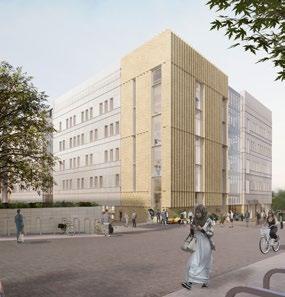

Scan or click on the link below to find out more about our new multimillion pound building go.herts.ac.uk/ specs-building-intro

68 Powering Potential
The new facilities will replicate the modern working environments that mirror our students’ future careers
Our inspiring alumni
Nathan works for the SOFIA mission, based in Palmdale, California at the Stratospheric Observatory for Infrared Astronomy. He has worked toward this role since completing his degree and a PhD in Astrophysics at the University of Sydney, Australia.


BSc (Hons) Astrophysics with study abroad year, 2012
Spaceflight Operations Engineer at Ispace Inc
“ I would not be where I am without the opportunities that were available while studying at the University. From extra-curricular projects, to connections with other universities, I’m thankful to the University for its guidance and support that kick-started my career.
The lecturers were world-class, active astronomers, so each class was dynamic to the ever-changing knowledge of their respective fields of research. Their willingness to accept keen students for extra-curricular research projects gave me early first-hand experience of the career I was about to launch myself into. Their international connections opened a path for me to do a research year at the University of Sydney, where I would later return to complete a PhD. ”

Checca is a Banking Business Analyst and Consultant and her background is in software development and data analytics.
Checca Aird
BSc Computer Science, (Software Engineering), 2015
Business Analyst/Product Owner at Optal
“ While working at PwC I realised that my favourite projects were the ones where I had the most impact, whether it was on a client’s business goals, their internal processes, or their software solutions. This led me to seek out a role as a banking analyst and ultimately to Capgemini.
Although I didn’t need a technical degree to get a role in the forensics department at PwC, or later at Capgemini, it has been a fantastic boon. My background in software development has helped me immensely on system delivery projects, and I have built on the software design skills I learnt and use them every day. ”
Katie is an Aerodynamic Design Engineer with the Williams Formula 1 team and her role involves designing mechanical and aerodynamic components for the wind tunnel. She leads the research and development for the wind tunnel front wing design and works closely with the aerodynamicists to improve design concepts and make wind tunnel tests as streamlined as possible.
MEng (Hons) Automotive Engineering with Motorsport, 2017 Aerodynamic Design Engineer, Williams Formula 1 team
“ Working in Formula 1 is very enjoyable and very rewarding when you see results on the track. Seeing Williams back on the podium and scoring points again in 2021 were particular highlights. I also enjoy the fast-paced environment and continual research and development required to keep up with technology and rules changes. ”
Scan here or click the link below to find out more about Katie’s career go.herts.ac.uk/katie

69
Samuel Nathan Richards
Katie Dobson
Research
Our computer science researchers have joined a global consortium in rapid response to Covid-19. Following a wave of reports from patients and clinicians about rapid onset smell loss, health organisations throughout the world have recognised anosmia as a marker for Covid-19, even in the absence of other symptoms. Scientists worldwide have united as the Global Consortium of Chemosensory Researchers (GCCR) to investigate the connection between the chemical senses and Covid-19. Professor Michael Schmuker and Dr Ritesh Kumar from our School are part of this group of global transdisciplinary scientists, clinicians, and patient advocates.
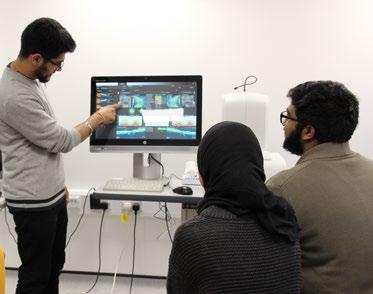
Professor Schmuker is a computer scientist dedicated to translating algorithms and processes from biology and the brain into solutions for data science and machine learning. He is a pioneer in neuromorphic computing and is leading a team of researchers to develop event-based algorithms for neuromorphic olfaction, low-latency detection and identification of chemical signals.
We are working with government and industry partners to develop and optimise new biodetection systems for the military and agriculture sectors that, for the first time, can autonomously detect, collect, process and analyse airborne toxins, bacteria and viruses in real time. These technologies have advanced the UK Government’s overall capability to defend armed forces and civilians against biological attacks. They underpin the design and development of a novel biodetection system, led by an industry consortium, that was signed into service for use by the Royal Air Force to protect British troops overseas, and later adapted into an export product for use in public venues. Associate Professors Dan McCluskey and Ian Johnston applied the underlying microfluidics principles to food security, resulting in the commercialisation of a unique early warning system that alerts farmers and growers to crop disease outbreaks before symptoms are visible.
70 Powering Potential
With more than 500 members in 40 countries, the GCCR will harness their reach to conduct and analyse worldwide evidencebased information to combat the spread of the virus.
A decade of research by Professor Pandelis Kourtessis, leader of our Cognitive Networks Laboratory has resulted in the commercialisation of a patented video streaming technology, co-developed with a leading satellite equipment provider and the BBC. The Broadcast WiFi platform has opened up market opportunities for companies in the satellite communications and wireless technology sectors, as well as benefitting live event operators and the general public. The BBC and Italy’s national broadcaster RAI have both used the technology to offer people an enhanced visitor experience at major arts and culture events, and it has fed into the development process of new global standards for wireless technology services.
Dr Tomasz Lukowski, from the mathematical physics group, has made important advances in developing novel methods for computing particle scattering amplitudes in Quantum Field Theory, working with collaborators at Oxford and Harvard. The work of Dr Lukowski and his student was recently selected by Wolfram Research Inc. to showcase cutting-edge applications of Mathematica. In 2021, he co-organised an international workshop on geometric methods in scattering amplitudes that was attended by more than 100 top researchers in the field. Our astrophysics group continues to have a leading role in international surveys of the radio and optical skies. The second data release of the LOFAR survey of radio sources in the northern sky is already the largest radio survey ever conducted, including more than 4 million sources, thanks in large part to millions of CPU-hours of processing on the University’s high performance computing facility. University of Hertfordshire astronomers are leading a follow-up optical survey, WEAVE-LOFAR, which will produce a million spectra of targets from the LOFAR source catalogue over the coming five years.
Future research
The research we do transforms lives by addressing global technological and societal challenges. Our research is a blend of fundamental and applied research and development that has direct impact for stakeholders. We will deliver world leading and international excellent research, enterprise and innovation, aligned to the UKRI priorities, as well as global and the industrial strategy grand challenges.
Our research spans a broad range of topics including: advanced materials and manufacturing aerospace structures and flight control
∙ artificial intelligence, robotics and artificial life
∙ atmospheric processes, air quality and climate science cognitive networks and secure digital systems computational neuroscience and neuromorphic computation
∙ data science, analytics and data innovation
∙ detection for security, biosecurity and agriculture energy and transport innovation in the built environment
∙ instrumentation
∙ microfluidic biological sample processing observational and numerical astrophysics mathematical and theoretical physics.
71
Discovery of 4.4 million objects in outer space
Our scientists have been working with a team of international experts to map 4.4 million objects of outer space. Working from the University’s high performance computing facility they were able to deploy algorithms to process the data. Not only does this provide an amazing picture of the distant universe, data in the release can be used by other scientists to search for a wide range of signals – such as those from nearby planets or galaxies, right through to faint signatures in the distant Universe.
More than a quarter of the northern sky was mapped using the Low Frequency Array (LOFAR), a pan-European radio telescope. The map included galaxies that harbour massive black holes, rapidly growing new stars, rare objects including colliding groups of distant galaxies and flaring stars within the Milky Way.
“ We’re able to observe and understand the significance of these objects because of advances in computing algorithms. I am sure there is a wealth of discoveries still to come, as LOFAR continues to reveal more of the distant universe. ”
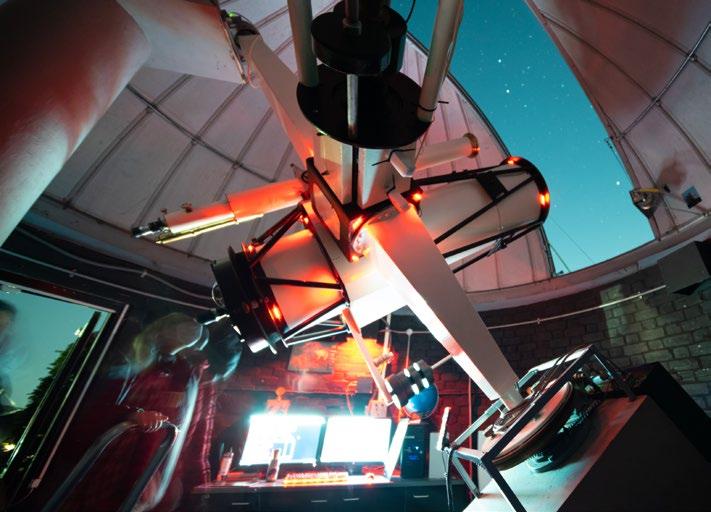 Professor Martin Hardcastle Head of Physics, Astronomy and Mathematics
Professor Martin Hardcastle Head of Physics, Astronomy and Mathematics
72 Powering Potential
Telescope at the Observatory in Bayfordbury
Championing Equality, Diversity and Inclusivity (EDI)
Mrs Carrie Ricketts and Dr Samantha Rolfe have led our campaign to improve EDI in Physics, Astronomy and Mathematics. We celebrated International Women’s Day, Black History Month and LGBTSTEM Day and organised bullying and harassment awareness training. Carrie and Samantha have supported female staff and students to attend leadership programmes, and in conjunction with the University’s Strategic Plan have been working to improve the awarding gap and the recruitment and internal promotion of minority groups. This work led to an Athena SWAN Silver award and Juno Champion status in Physics, recognising our commitment to advancing gender equality.
The School has partnered with the Women’s Engineering Society (WES), to advance the careers of women in science, technology and engineering. This work, to support EDI amongst research students, staff and students, led by Dr Martina Doolan and Mrs Susan Murray, secured an Athena SWAN Bronze award for Engineering and Computer Science.
“ The Women’s Engineering Society is delighted that we are partnering with the University of Hertfordshire. The University is committed to gender equality, as recognised by its Athena Swan Bronze award and Silver status for two of its schools. It also has a growing reputation for its engineering degree courses, and WES is proud that a University alumna is a member of the WES Council. We are looking forward to supporting female engineering students at Hertfordshire and to working with the University to encourage more women to study engineering. ”
Elizabeth Donnelly Chief Executive Officer for the Women’s Engineering Society
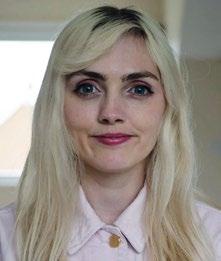
Kim is a member of our alumni and an advocate of WES.
“ WES is a fantastic charity that supports women engineers throughout their career. I would recommend you apply for all the opportunities that you see that spark your interest, and to gain as much experience as possible during your studies. ”
Kim Everitt BEng (Hons) Automotive with
Motorsport, 2018
Scan here or click on the link below to find out more about Kim’s amazing career in motorsport go.herts.ac.uk/kim-everitt

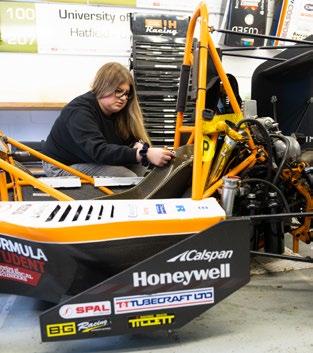
73
Leading the way on international PhD opportunities
University Alliance and their partners invited applications for a scheme that will support international researchers to gain doctoral fellowships at some of the country’s leading technical and professional universities.

The University is one of eight institutions who are part of the groundbreaking COFUND Doctoral Fellowship programme. The DTA3/ COFUND builds on the Doctoral Training Alliance, which is the largest nationwide multi-partner initiative of its kind. Run by University Alliance, it builds on the research strengths and industry-focus of its members to produce independent, highly-employable researchers with knowledge, expertise and skills in strategically important areas.
This is the third year the scheme has run, which so far has enabled over 50 students to study in the UK. The programme is supported by a €6.5 million grant from the Marie Skłodowska-Curie COFUND Doctoral Fellowship programme.
The School is growing our doctoral student programme and has numerous opportunities across most areas of our research, for UK, EU and international students to study for a PhD.
“ This programme enables the University to develop talented researchers in the field of Energy research to be able to respond to the fast-changing needs of industry and society at large in this important sector.
”
Rodney Day Dean of the School of Physics, Engineering and Computer Science
74 Powering Potential
The University is one of eight institutions who are part of the groundbreaking COFUND Doctoral Fellowship programme.
Future aspirations
We are committed to having a positive transformational impact on our community, and we will:
∙ support the development of research and innovation that is accessible, transparent, cooperative and easily transferable to business and enterprise
∙ work closely in partnership with businesses and our international academic collaborators on research and innovation projects
∙ establish Industrial Supported Doctoral Training Centres to fund solutions focused on Doctoral research that provides industry with new science and technology that has impact
∙ provide access to outstanding laboratory equipment and instrumentation, as well as modelling and simulation facilities and staff expertise maximise the potential of local and regional technology businesses and industry by providing highly qualified graduates to support and drive organisations.
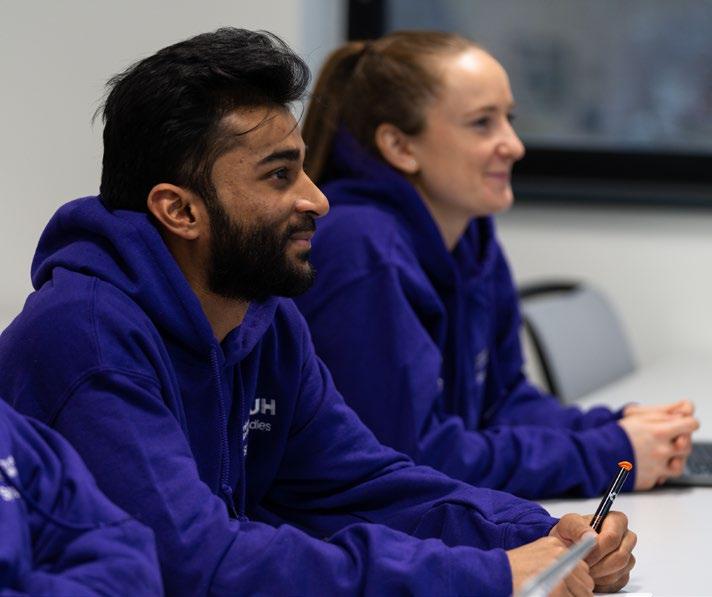
75
School of Social Sciences, Humanities and Education
Subject areas
Early Childhood Education and Teacher Training
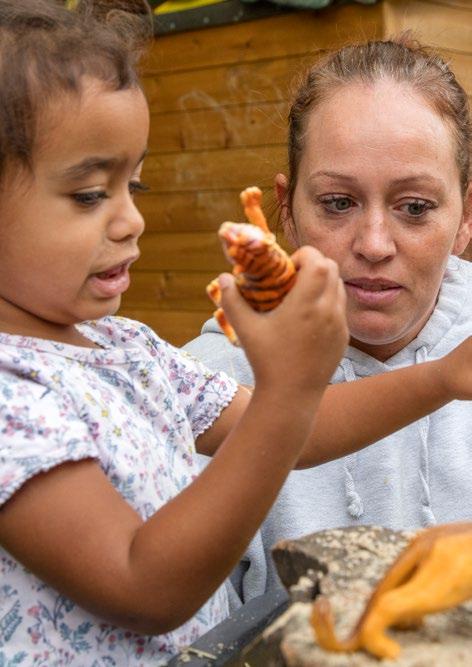
English Language, Linguistics and Modern Languages
History, Folklore, English Literature and Creative Writing Journalism, Public Relations, Media and Communications Mental Health and Wellbeing Outdoor Environmental Education Philosophy
Politics and International Relations
Psychology in Education Sociology
Our commitment to transforming lives is important to me and is shared across our School. It means we focus not just on building our students’ confidence, but also on how we can give back to society and make a difference to people’s lives.
 Dr Lyn Trodd Dean of Social Sciences, Humanities and Education
Dr Lyn Trodd Dean of Social Sciences, Humanities and Education
76 Powering Potential
History, English and Philosophy made a significant contribution to the University's excellent outcome in the recent Research Excellence Framework

The School of Social Sciences, Humanities and Education is a diverse and vibrant community. Our staff are active researchers, scholars and practitioners generating outstanding publications and working closely in the fields of education and with the heritage and culture sectors.
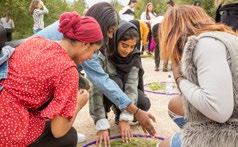
Our graduates are encouraged throughout their studies to explore the application of their learning and engage in work experience. They excel in the transferable skills that employers require. They have excellent communication, information literacy, networking and teamworking skills and are trained to think critically and creatively in order to conduct effective research and analysis.
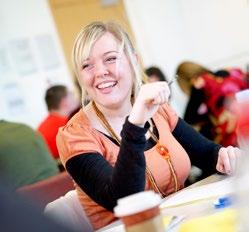
We are ranked 11th for Education (Guardian University Guide 2022)
We are one of the Department for Education’s top 10 teacher training providers in England for employability
77
Our experts are changing lives
From tackling climate change to helping ensure food and information security, our experts are committed to protecting people and the planet by finding innovative and sustainable solutions to the most critical social, environmental and economic challenges facing society today.
Dr Jo McDowell
Principal
Lecturer in English Language and Linguistics


We have a wealth of knowledge and insight in the School, including Dr McDowell who has been working on projects concerning classroom teaching. This involves working with local primary schools, head teachers and practitioners in Hertfordshire. Her work informs education policy and can be used to develop teacher training workshops. She is the editor of a forthcoming publication for De-Gendering Gendered Occupations: Analysing Communicative Practices in the Workplace, published by Routledge in 2020.
Professor Davies is the author of several publications, including ‘A Supernatural Struggle: Magic, Divination and Faith during the First World War’. He has worked with the Ashmolean Museum and a number of other heritage organisations to identify and preserve collections and to curate exhibitions. Owen is currently working on a project with the Museum of London to examine the phenomena of witch-bottles and their concealment.
Professor Owen Davies
Professor of Social History
Victoria Pateman
PGCE, MA Social Philosophy, BA (Hons) English Literature


Head of Department: Initial Teacher Education and Early Childhood
Victoria gained her teaching qualification (PGCE English) with the University of Hertfordshire and taught English and media in secondary schools in Hertfordshire before moving to the University to lead the English PGCE course. Victoria now leads a team of over 30 Initial Teacher Education (ITE) and Early Childhood specialists. As the ITE provider of choice for over 18 School Direct Lead School partnerships, 400 primary and secondary schools, and Multi Academy Trusts, Victoria chairs our ITE Partnership Steering Committee and represents their views at a regional and national level through DfE Initial Teacher Training Advisory Group, Universities’ Council for the Education of Teachers and University Alliance’s ITE network.
78 Powering Potential
here or click on the link below to find out more about our research
Scan
expertise go.herts.ac.uk/herts-research
Our inspiring alumni
Jake is a Year 4 teacher in a junior school near the University. He gained a PGCE in Primary Education in 2017, following an undergraduate degree at the University in Education Studies.

Jake Garwood
BA (Hons) Education Studies
PGCE in Primary Education, 2017 Teacher
“ My studies at the University sparked the passion I have for education. For not only teaching, but the philosophy, politics and critical debates surrounding it. Engaging modules at the University and inspiring tutors played a key part in making me the teacher I am today.
I knew the University had an excellent reputation for teacher training, so decided there was no better place to study to achieve my goal of being the best possible teacher I can be. ”
Eleanor did a six month internship at a literary agency during her last year at the University, then went on to do a work experience placement at Penguin before getting a job in publishing recruitment. After eight months she was lucky enough to get a job with Canelo before securing her current role at HarperCollins.
Eleanor Pilcher

History and Creative Writing, 2016 Marketing Manager at Avon, HarperCollins Publishers
Charlie Edgar
Mass Communications, 2016 Coldwell Banker, Global Luxury
“ My creative writing degree covered many aspects of writing from non-fiction, fiction and poetry. I was writing a novel which I later submitted to literary agencies, at the advice of my tutor, and through these submissions I came to realise that I had an interest in working for a literary agency. I applied for an internship at the start of my third year and was lucky enough to get it and from there continued to write and work in publishing. ”
Charlie is an assistant to the Beverly Hills real estate agent, and Coldwell Banker, and sells high-end luxury property in the Los Angeles area.
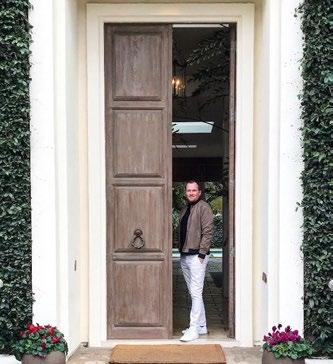
“ My studies provided me with the opportunity to interact and communicate with a wide number of individuals from all backgrounds and experiences. I learnt how to be selfsufficient, motivated and pursue all opportunities for growth. ”
Charlie chose to study at the University because of its study abroad opportunities and connections to London. He was also drawn to the architectural beauty of the de Havilland Campus, and the large selection of on-campus housing.
79
Research
Research in the study of educational leadership
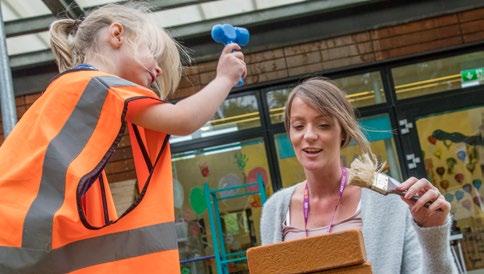

Professor Philip Woods is internationally recognised for his research into democratic and distributed leadership in education. He is a former Chair and a current Council member of the British Educational Leadership, Management and Administration Society, and Director of the Centre for Educational Leadership and Professor of Educational Policy, Democracy and Leadership. Philip is the author of more than 130 publications and his work focuses on education, democracy, leadership, policy and governance, with special attention to change towards democratic and holistic organisational environments. His work includes the design of resources for senior leaders, teachers and others, to support the development of distributed and democratic leadership, working with international colleagues through European Union funded networks.
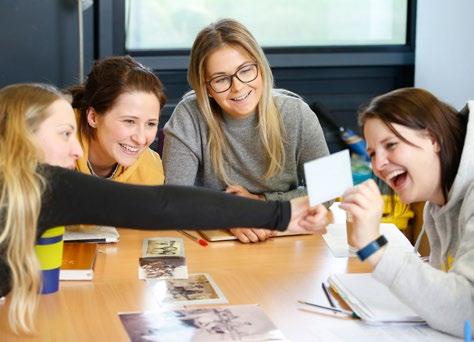
80 Powering Potential
Our researchers work within heritage, education and the culture and heritage sectors to enhance our understanding of the way we live now, our pasts and our future. Researchers in history and literature work closely with theatres, museums and archives to identify and preserve artefacts and memories and to curate exhibitions.
Our linguists’ research is reshaping understanding of how language influences behaviour and practice in the caring professions, especially in nursing and teaching. We also explore how language acquisition impacts upon learning.
Our research and practice includes work that helps us interpret and understand the world around us. Within the School there are researchers working on politics and international relations and the impact of modern media and communications alongside active and widely-published academic and creative writers.
Our oral history team believe that memories matter. Every year, students, staff and members of the local community are professionally trained in the art of interviewing, going on to take part in memory-gathering projects. These preserve amazing stories which are made available in an online archive which can be accessed around the world.
Our partners in these projects have included Waitrose, Watford Football Club and the prestigious Society of Radiographers, plus local museums and a choral society! We have preserved the memories of those who worked for the de Havilland aircraft company, which was sited on what is now the University’s de Havilland Campus.
In association with the University of Western Australia, stories were collected of migrants to Australia and their relatives who remained in the UK. Team members have been recording their own audio diaries and compiling a photographic archive as part of our Virus Diaries project, which began in March 2020.
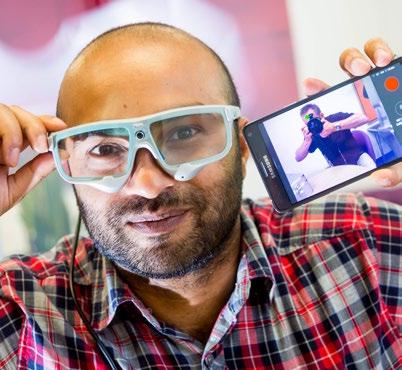
Enhancing our understanding of the human experience
81
Our research and practice includes work that helps us interpret and understand the world around us
Future aspirations
Our School creates transformative benefits for the economy and our communities through our teaching and training expertise and in media and communications, preserving and curating our business heritage, and through our research to support and enhance the creative industries. We work in partnership with more than 400 schools across the region. We are committed to providing new innovative courses and we are planning to offer: a degree in Sociology and Criminology a degree in Psychology in Education a MA in Geo-Politics a MA in Mental Health and Well-being in Education a PG Cert in the History of Minorities in the UK modules on cultural awareness and languages for business.
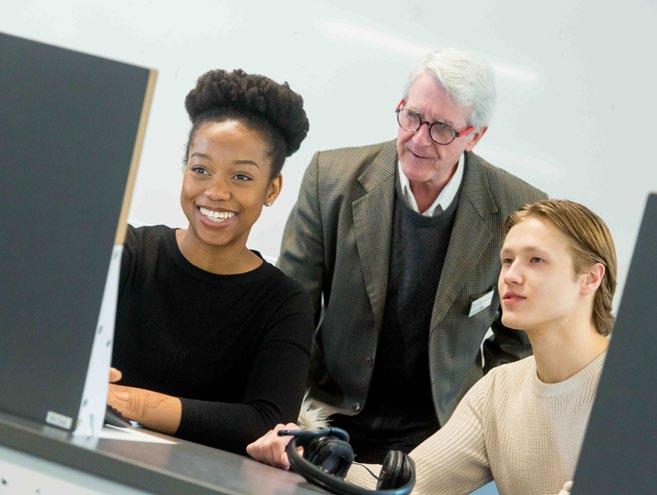
82 Powering Potential

HS1297/DS/0422 University of
Hatfield, UK AL10 9AB +44 (0)1707 284000 herts.ac.uk /uniofherts @UniofHerts @UniofHerts
Hertfordshire





































 Damian Ward Dean of the Hertfordshire Business School
Damian Ward Dean of the Hertfordshire Business School
































 Ruth Camp Solicitor, Shelter
Ruth Camp Solicitor, Shelter



 Dr Mairi
Dr Mairi




































 Dr Richard Southern Dean of the School of Life and Medical Sciences
Dr Richard Southern Dean of the School of Life and Medical Sciences






 Professor Katherine Brown PhD, C.Psychol, FHEA
Professor Katherine Brown PhD, C.Psychol, FHEA






 Professor Elizabeth Pike
Professor Elizabeth Pike






















 Professor Martin Hardcastle Head of Physics, Astronomy and Mathematics
Professor Martin Hardcastle Head of Physics, Astronomy and Mathematics






 Dr Lyn Trodd Dean of Social Sciences, Humanities and Education
Dr Lyn Trodd Dean of Social Sciences, Humanities and Education















